

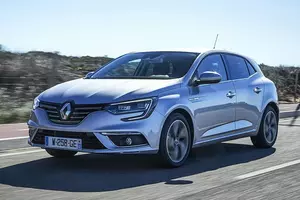
2016 Megane IV
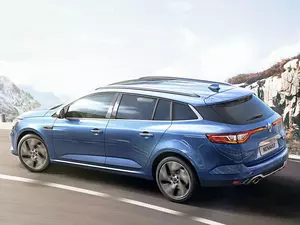
2016 Megane IV Grandtour
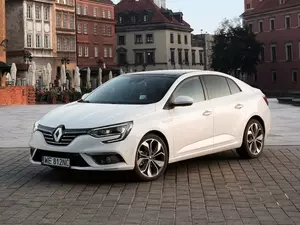
2016 Megane IV Sedan
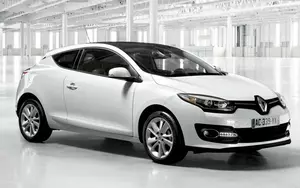
2014 Megane III Coupe (Phase III, 2014)
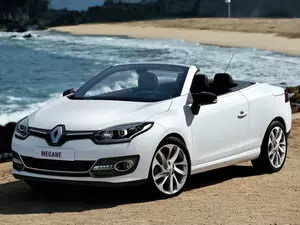
2014 Megane III CC (Phase III, 2014)

2014 Megane III (Phase III, 2014)
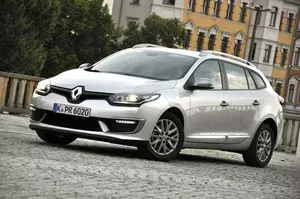
2014 Megane III Grandtour (Phase III, 2014)
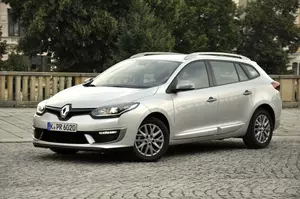
2012 Megane III Grandtour (Phase II, 2012)
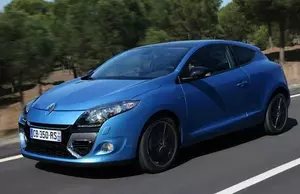
2012 Megane III (Phase II, 2012)
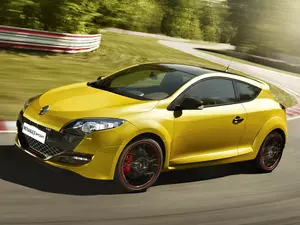
2012 Megane III Coupe (Phase II, 2012)
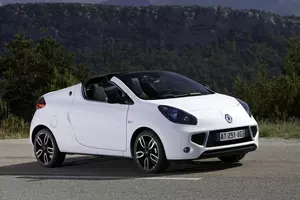
2011 Megane Coupe Monaco GP
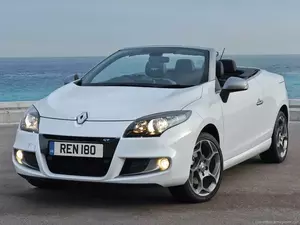
2010 Megane III CC
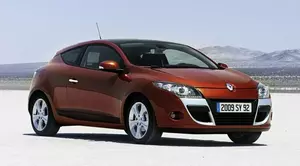
2008 Megane III Coupe
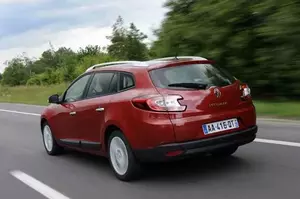
2009 Megane III Grandtour
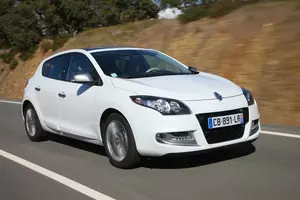
2008 Megane III
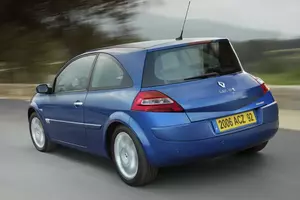
2006 Megane II (Phase II, 2006)
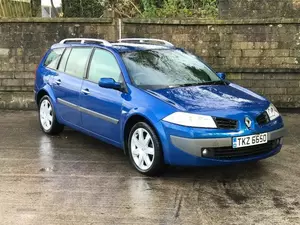
2006 Megane II Grandtour (Phase II, 2006)
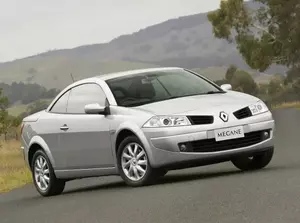
2006 Megane II CC (Phase II, 2006)

2006 Megane II Coupe (Phase II, 2006)
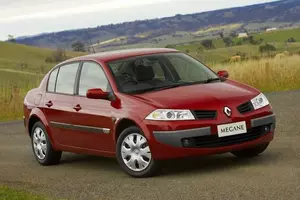
2006 Megane II Classic (Phase II, 2006)
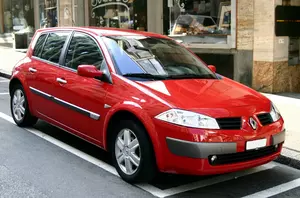
2002 Megane II Coupe
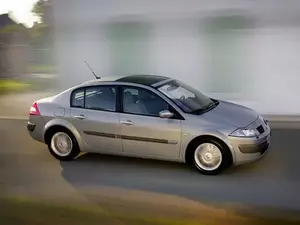
2002 Megane II
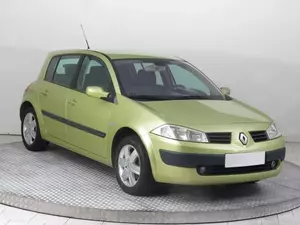
2003 Megane II CC
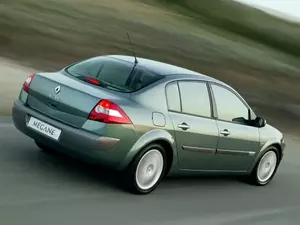
2003 Megane II Classic
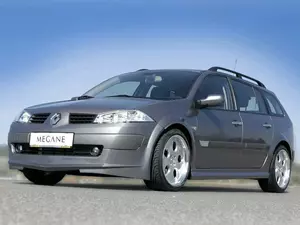
2003 Megane II Grandtour
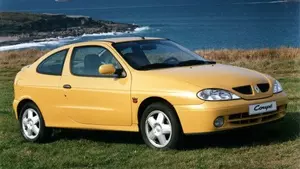
1999 Megane I Coupe (Phase II, 1999)
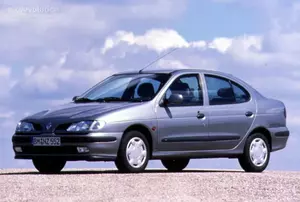
1999 Megane I (Phase II, 1999)

1999 Megane I Grandtour (Phase II, 1999)

1999 Megane I Classic (Phase II, 1999)
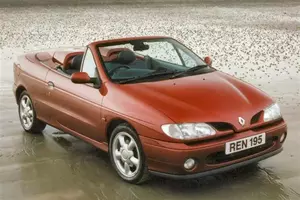
1999 Megane I Cabriolet (Phase II, 1999)
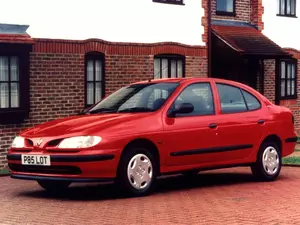
1996 Megane I Classic (LA)
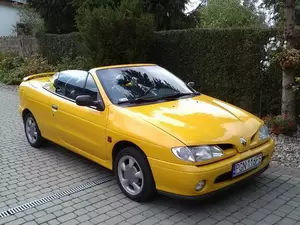
1997 Megane I Cabriolet (EA)
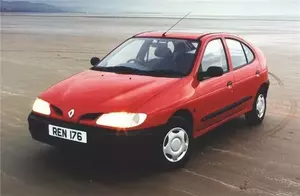
1996 Megane I (BA)
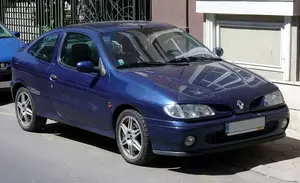
1996 Megane I Coach (DA)

| Vehicle | Curb weight | Difference from world's smallest | Weight to power ratio | 0—60 mph acceleration ratio | Consumption ratio |
|---|---|---|---|---|---|
| 1.2 Energy TCe |
1205 kg / 2657 lbs |
780 kg (1720 lbs) heavier | 9 kg to 1 hp | 119 kg/s (262 lbs/s) |
227 kg/L (501 lbs/L) |
| 1.6 SCe |
1205 kg / 2657 lbs |
780 kg (1720 lbs) heavier | 10 kg to 1 hp | 104 kg/s (229 lbs/s) | - |
| 1.5 Energy dCi |
1311 kg / 2891 lbs |
886 kg (1954 lbs) heavier | 12 kg to 1 hp | 112 kg/s (247 lbs/s) |
354 kg/L (781 lbs/L) |
| GT 1.6 Energy TCe |
1392 kg / 3069 lbs |
967 kg (2132 lbs) heavier | 7 kg to 1 hp | 208 kg/s (459 lbs/s) |
232 kg/L (512 lbs/L) |
| 1.6 Energy dCi |
1318 kg / 2906 lbs |
893 kg (1969 lbs) heavier | 10 kg to 1 hp | 139 kg/s (306 lbs/s) |
330 kg/L (728 lbs/L) |
| RS 1.8 |
1407 kg / 3102 lbs |
982 kg (2165 lbs) heavier | 5 kg to 1 hp | 256 kg/s (564 lbs/s) |
198 kg/L (437 lbs/L) |
| RS Trophy 1.8 |
1419 kg / 3129 lbs |
994 kg (2192 lbs) heavier | 5 kg to 1 hp | 263 kg/s (580 lbs/s) |
175 kg/L (386 lbs/L) |
| 1.3 TCe |
1259 kg / 2776 lbs |
834 kg (1839 lbs) heavier | 9 kg to 1 hp | 145 kg/s (320 lbs/s) | - |
| 1.5 Blue dCi |
1346 kg / 2968 lbs |
921 kg (2031 lbs) heavier | 12 kg to 1 hp | 133 kg/s (293 lbs/s) | - |
| 1.7 Blue dCi |
1443 kg / 3182 lbs |
1018 kg (2245 lbs) heavier | 10 kg to 1 hp | 143 kg/s (315 lbs/s) | - |
| Vehicle | 1.2 Energy TCe |
|---|---|
| Curb weight |
1205 kg / 2657 lbs |
| Difference from world's smallest | 780 kg (780 lbs) heavier |
| Weight to power ratio | 9 kg to 1 hp |
| 0—60 mph acceleration ratio | 119 kg/s (262 lbs/s) |
| Consumption ratio |
227 kg/L (501 lbs/L) |
| Vehicle | 1.6 SCe |
| Curb weight |
1205 kg / 2657 lbs |
| Difference from world's smallest | 780 kg (780 lbs) heavier |
| Weight to power ratio | 10 kg to 1 hp |
| 0—60 mph acceleration ratio | 104 kg/s (229 lbs/s) |
| Consumption ratio | - |
| Vehicle | 1.5 Energy dCi |
| Curb weight |
1311 kg / 2891 lbs |
| Difference from world's smallest | 886 kg (886 lbs) heavier |
| Weight to power ratio | 12 kg to 1 hp |
| 0—60 mph acceleration ratio | 112 kg/s (247 lbs/s) |
| Consumption ratio |
354 kg/L (781 lbs/L) |
| Vehicle | GT 1.6 Energy TCe |
| Curb weight |
1392 kg / 3069 lbs |
| Difference from world's smallest | 967 kg (967 lbs) heavier |
| Weight to power ratio | 7 kg to 1 hp |
| 0—60 mph acceleration ratio | 208 kg/s (459 lbs/s) |
| Consumption ratio |
232 kg/L (512 lbs/L) |
| Vehicle | 1.6 Energy dCi |
| Curb weight |
1318 kg / 2906 lbs |
| Difference from world's smallest | 893 kg (893 lbs) heavier |
| Weight to power ratio | 10 kg to 1 hp |
| 0—60 mph acceleration ratio | 139 kg/s (306 lbs/s) |
| Consumption ratio |
330 kg/L (728 lbs/L) |
| Vehicle | RS 1.8 |
| Curb weight |
1407 kg / 3102 lbs |
| Difference from world's smallest | 982 kg (982 lbs) heavier |
| Weight to power ratio | 5 kg to 1 hp |
| 0—60 mph acceleration ratio | 256 kg/s (564 lbs/s) |
| Consumption ratio |
198 kg/L (437 lbs/L) |
| Vehicle | RS Trophy 1.8 |
| Curb weight |
1419 kg / 3129 lbs |
| Difference from world's smallest | 994 kg (994 lbs) heavier |
| Weight to power ratio | 5 kg to 1 hp |
| 0—60 mph acceleration ratio | 263 kg/s (580 lbs/s) |
| Consumption ratio |
175 kg/L (386 lbs/L) |
| Vehicle | 1.3 TCe |
| Curb weight |
1259 kg / 2776 lbs |
| Difference from world's smallest | 834 kg (834 lbs) heavier |
| Weight to power ratio | 9 kg to 1 hp |
| 0—60 mph acceleration ratio | 145 kg/s (320 lbs/s) |
| Consumption ratio | - |
| Vehicle | 1.5 Blue dCi |
| Curb weight |
1346 kg / 2968 lbs |
| Difference from world's smallest | 921 kg (921 lbs) heavier |
| Weight to power ratio | 12 kg to 1 hp |
| 0—60 mph acceleration ratio | 133 kg/s (293 lbs/s) |
| Consumption ratio | - |
| Vehicle | 1.7 Blue dCi |
| Curb weight |
1443 kg / 3182 lbs |
| Difference from world's smallest | 1018 kg (1018 lbs) heavier |
| Weight to power ratio | 10 kg to 1 hp |
| 0—60 mph acceleration ratio | 143 kg/s (315 lbs/s) |
| Consumption ratio | - |

| Vehicle | Curb weight | Difference from world's smallest | Weight to power ratio | 0—60 mph acceleration ratio | Consumption ratio |
|---|---|---|---|---|---|
| 1.5 Energy dCi |
1312 kg / 2893 lbs |
887 kg (1956 lbs) heavier | 12 kg to 1 hp | 119 kg/s (262 lbs/s) |
375 kg/L (827 lbs/L) |
| 1.2 Energy TCe |
1291 kg / 2847 lbs |
866 kg (1910 lbs) heavier | 13 kg to 1 hp | 108 kg/s (238 lbs/s) |
239 kg/L (527 lbs/L) |
| GT 1.6 Energy TCe |
1392 kg / 3069 lbs |
967 kg (2132 lbs) heavier | 7 kg to 1 hp | 199 kg/s (439 lbs/s) |
232 kg/L (512 lbs/L) |
| 1.6 Energy dCi |
1394 kg / 3074 lbs |
969 kg (2137 lbs) heavier | 11 kg to 1 hp | 138 kg/s (304 lbs/s) |
349 kg/L (770 lbs/L) |
| 1.6 SCe |
1227 kg / 2706 lbs |
802 kg (1769 lbs) heavier | 11 kg to 1 hp | 109 kg/s (240 lbs/s) |
195 kg/L (430 lbs/L) |
| GT 1.6 Energy dCi |
1425 kg / 3142 lbs |
1000 kg (2205 lbs) heavier | 9 kg to 1 hp | 168 kg/s (370 lbs/s) |
303 kg/L (668 lbs/L) |
| 1.3 TCe |
1315 kg / 2900 lbs |
890 kg (1963 lbs) heavier | 9 kg to 1 hp | 140 kg/s (309 lbs/s) | - |
| 1.5 Blue dCi |
1398 kg / 3083 lbs |
973 kg (2146 lbs) heavier | 12 kg to 1 hp | 134 kg/s (295 lbs/s) | - |
| 1.7 Blue dCi |
1501 kg / 3310 lbs |
1076 kg (2373 lbs) heavier | 10 kg to 1 hp | - | - |
| Vehicle | 1.5 Energy dCi |
|---|---|
| Curb weight |
1312 kg / 2893 lbs |
| Difference from world's smallest | 887 kg (887 lbs) heavier |
| Weight to power ratio | 12 kg to 1 hp |
| 0—60 mph acceleration ratio | 119 kg/s (262 lbs/s) |
| Consumption ratio |
375 kg/L (827 lbs/L) |
| Vehicle | 1.2 Energy TCe |
| Curb weight |
1291 kg / 2847 lbs |
| Difference from world's smallest | 866 kg (866 lbs) heavier |
| Weight to power ratio | 13 kg to 1 hp |
| 0—60 mph acceleration ratio | 108 kg/s (238 lbs/s) |
| Consumption ratio |
239 kg/L (527 lbs/L) |
| Vehicle | GT 1.6 Energy TCe |
| Curb weight |
1392 kg / 3069 lbs |
| Difference from world's smallest | 967 kg (967 lbs) heavier |
| Weight to power ratio | 7 kg to 1 hp |
| 0—60 mph acceleration ratio | 199 kg/s (439 lbs/s) |
| Consumption ratio |
232 kg/L (512 lbs/L) |
| Vehicle | 1.6 Energy dCi |
| Curb weight |
1394 kg / 3074 lbs |
| Difference from world's smallest | 969 kg (969 lbs) heavier |
| Weight to power ratio | 11 kg to 1 hp |
| 0—60 mph acceleration ratio | 138 kg/s (304 lbs/s) |
| Consumption ratio |
349 kg/L (770 lbs/L) |
| Vehicle | 1.6 SCe |
| Curb weight |
1227 kg / 2706 lbs |
| Difference from world's smallest | 802 kg (802 lbs) heavier |
| Weight to power ratio | 11 kg to 1 hp |
| 0—60 mph acceleration ratio | 109 kg/s (240 lbs/s) |
| Consumption ratio |
195 kg/L (430 lbs/L) |
| Vehicle | GT 1.6 Energy dCi |
| Curb weight |
1425 kg / 3142 lbs |
| Difference from world's smallest | 1000 kg (1000 lbs) heavier |
| Weight to power ratio | 9 kg to 1 hp |
| 0—60 mph acceleration ratio | 168 kg/s (370 lbs/s) |
| Consumption ratio |
303 kg/L (668 lbs/L) |
| Vehicle | 1.3 TCe |
| Curb weight |
1315 kg / 2900 lbs |
| Difference from world's smallest | 890 kg (890 lbs) heavier |
| Weight to power ratio | 9 kg to 1 hp |
| 0—60 mph acceleration ratio | 140 kg/s (309 lbs/s) |
| Consumption ratio | - |
| Vehicle | 1.5 Blue dCi |
| Curb weight |
1398 kg / 3083 lbs |
| Difference from world's smallest | 973 kg (973 lbs) heavier |
| Weight to power ratio | 12 kg to 1 hp |
| 0—60 mph acceleration ratio | 134 kg/s (295 lbs/s) |
| Consumption ratio | - |
| Vehicle | 1.7 Blue dCi |
| Curb weight |
1501 kg / 3310 lbs |
| Difference from world's smallest | 1076 kg (1076 lbs) heavier |
| Weight to power ratio | 10 kg to 1 hp |
| 0—60 mph acceleration ratio | - |
| Consumption ratio | - |

| Vehicle | Curb weight | Difference from world's smallest | Weight to power ratio | 0—60 mph acceleration ratio | Consumption ratio |
|---|---|---|---|---|---|
| 1.6 SCe |
1287 kg / 2838 lbs |
862 kg (1901 lbs) heavier | 11 kg to 1 hp | 103 kg/s (227 lbs/s) |
195 kg/L (430 lbs/L) |
| 1.2 Energy TCe |
1315 kg / 2900 lbs |
890 kg (1963 lbs) heavier | 10 kg to 1 hp | 126 kg/s (278 lbs/s) |
244 kg/L (538 lbs/L) |
| 1.5 Energy dCi |
1320 kg / 2911 lbs |
895 kg (1974 lbs) heavier | 12 kg to 1 hp | 111 kg/s (245 lbs/s) |
357 kg/L (787 lbs/L) |
| 1.6 Energy dCi |
1401 kg / 3089 lbs |
976 kg (2152 lbs) heavier | 11 kg to 1 hp | 140 kg/s (309 lbs/s) |
350 kg/L (772 lbs/L) |
| 1.5 Blue dCi |
1320 kg / 2911 lbs |
895 kg (1974 lbs) heavier | 11 kg to 1 hp | 126 kg/s (278 lbs/s) |
330 kg/L (728 lbs/L) |
| 1.3 TCe |
1231 kg / 2714 lbs |
806 kg (1777 lbs) heavier | 9 kg to 1 hp | 121 kg/s (267 lbs/s) |
224 kg/L (494 lbs/L) |
| Vehicle | 1.6 SCe |
|---|---|
| Curb weight |
1287 kg / 2838 lbs |
| Difference from world's smallest | 862 kg (862 lbs) heavier |
| Weight to power ratio | 11 kg to 1 hp |
| 0—60 mph acceleration ratio | 103 kg/s (227 lbs/s) |
| Consumption ratio |
195 kg/L (430 lbs/L) |
| Vehicle | 1.2 Energy TCe |
| Curb weight |
1315 kg / 2900 lbs |
| Difference from world's smallest | 890 kg (890 lbs) heavier |
| Weight to power ratio | 10 kg to 1 hp |
| 0—60 mph acceleration ratio | 126 kg/s (278 lbs/s) |
| Consumption ratio |
244 kg/L (538 lbs/L) |
| Vehicle | 1.5 Energy dCi |
| Curb weight |
1320 kg / 2911 lbs |
| Difference from world's smallest | 895 kg (895 lbs) heavier |
| Weight to power ratio | 12 kg to 1 hp |
| 0—60 mph acceleration ratio | 111 kg/s (245 lbs/s) |
| Consumption ratio |
357 kg/L (787 lbs/L) |
| Vehicle | 1.6 Energy dCi |
| Curb weight |
1401 kg / 3089 lbs |
| Difference from world's smallest | 976 kg (976 lbs) heavier |
| Weight to power ratio | 11 kg to 1 hp |
| 0—60 mph acceleration ratio | 140 kg/s (309 lbs/s) |
| Consumption ratio |
350 kg/L (772 lbs/L) |
| Vehicle | 1.5 Blue dCi |
| Curb weight |
1320 kg / 2911 lbs |
| Difference from world's smallest | 895 kg (895 lbs) heavier |
| Weight to power ratio | 11 kg to 1 hp |
| 0—60 mph acceleration ratio | 126 kg/s (278 lbs/s) |
| Consumption ratio |
330 kg/L (728 lbs/L) |
| Vehicle | 1.3 TCe |
| Curb weight |
1231 kg / 2714 lbs |
| Difference from world's smallest | 806 kg (806 lbs) heavier |
| Weight to power ratio | 9 kg to 1 hp |
| 0—60 mph acceleration ratio | 121 kg/s (267 lbs/s) |
| Consumption ratio |
224 kg/L (494 lbs/L) |

| Vehicle | Curb weight | Difference from world's smallest | Weight to power ratio | 0—60 mph acceleration ratio | Consumption ratio |
|---|---|---|---|---|---|
| RS Trophy-R 2.0 |
1297 kg / 2860 lbs |
872 kg (1923 lbs) heavier | 5 kg to 1 hp | 236 kg/s (520 lbs/s) |
173 kg/L (381 lbs/L) |
| 1.6 Energy dCi |
1320 kg / 2911 lbs |
895 kg (1974 lbs) heavier | 10 kg to 1 hp | 142 kg/s (313 lbs/s) |
330 kg/L (728 lbs/L) |
| 1.6 16V |
1205 kg / 2657 lbs |
780 kg (1720 lbs) heavier | 11 kg to 1 hp | 121 kg/s (267 lbs/s) |
175 kg/L (386 lbs/L) |
| 1.5 dCi |
1205 kg / 2657 lbs |
780 kg (1720 lbs) heavier | 11 kg to 1 hp | 109 kg/s (240 lbs/s) |
287 kg/L (633 lbs/L) |
| 1.2 Energy TCe |
1205 kg / 2657 lbs |
780 kg (1720 lbs) heavier | 9 kg to 1 hp | 131 kg/s (289 lbs/s) |
215 kg/L (474 lbs/L) |
| RS 2.0 |
1379 kg / 3041 lbs |
954 kg (2104 lbs) heavier | 5 kg to 1 hp | 242 kg/s (534 lbs/s) |
184 kg/L (406 lbs/L) |
| RS Trophy 2.0 |
1379 kg / 3041 lbs |
954 kg (2104 lbs) heavier | 5 kg to 1 hp | 242 kg/s (534 lbs/s) |
184 kg/L (406 lbs/L) |
| 1.5 Energy dCi |
1205 kg / 2657 lbs |
780 kg (1720 lbs) heavier | 11 kg to 1 hp | 105 kg/s (232 lbs/s) |
344 kg/L (759 lbs/L) |
| GT 2.0 dCi |
1424 kg / 3140 lbs |
999 kg (2203 lbs) heavier | 9 kg to 1 hp | 170 kg/s (375 lbs/s) |
241 kg/L (531 lbs/L) |
| GT 2.0 TCe |
1320 kg / 2911 lbs |
895 kg (1974 lbs) heavier | 6 kg to 1 hp | 203 kg/s (448 lbs/s) |
181 kg/L (399 lbs/L) |
| Vehicle | RS Trophy-R 2.0 |
|---|---|
| Curb weight |
1297 kg / 2860 lbs |
| Difference from world's smallest | 872 kg (872 lbs) heavier |
| Weight to power ratio | 5 kg to 1 hp |
| 0—60 mph acceleration ratio | 236 kg/s (520 lbs/s) |
| Consumption ratio |
173 kg/L (381 lbs/L) |
| Vehicle | 1.6 Energy dCi |
| Curb weight |
1320 kg / 2911 lbs |
| Difference from world's smallest | 895 kg (895 lbs) heavier |
| Weight to power ratio | 10 kg to 1 hp |
| 0—60 mph acceleration ratio | 142 kg/s (313 lbs/s) |
| Consumption ratio |
330 kg/L (728 lbs/L) |
| Vehicle | 1.6 16V |
| Curb weight |
1205 kg / 2657 lbs |
| Difference from world's smallest | 780 kg (780 lbs) heavier |
| Weight to power ratio | 11 kg to 1 hp |
| 0—60 mph acceleration ratio | 121 kg/s (267 lbs/s) |
| Consumption ratio |
175 kg/L (386 lbs/L) |
| Vehicle | 1.5 dCi |
| Curb weight |
1205 kg / 2657 lbs |
| Difference from world's smallest | 780 kg (780 lbs) heavier |
| Weight to power ratio | 11 kg to 1 hp |
| 0—60 mph acceleration ratio | 109 kg/s (240 lbs/s) |
| Consumption ratio |
287 kg/L (633 lbs/L) |
| Vehicle | 1.2 Energy TCe |
| Curb weight |
1205 kg / 2657 lbs |
| Difference from world's smallest | 780 kg (780 lbs) heavier |
| Weight to power ratio | 9 kg to 1 hp |
| 0—60 mph acceleration ratio | 131 kg/s (289 lbs/s) |
| Consumption ratio |
215 kg/L (474 lbs/L) |
| Vehicle | RS 2.0 |
| Curb weight |
1379 kg / 3041 lbs |
| Difference from world's smallest | 954 kg (954 lbs) heavier |
| Weight to power ratio | 5 kg to 1 hp |
| 0—60 mph acceleration ratio | 242 kg/s (534 lbs/s) |
| Consumption ratio |
184 kg/L (406 lbs/L) |
| Vehicle | RS Trophy 2.0 |
| Curb weight |
1379 kg / 3041 lbs |
| Difference from world's smallest | 954 kg (954 lbs) heavier |
| Weight to power ratio | 5 kg to 1 hp |
| 0—60 mph acceleration ratio | 242 kg/s (534 lbs/s) |
| Consumption ratio |
184 kg/L (406 lbs/L) |
| Vehicle | 1.5 Energy dCi |
| Curb weight |
1205 kg / 2657 lbs |
| Difference from world's smallest | 780 kg (780 lbs) heavier |
| Weight to power ratio | 11 kg to 1 hp |
| 0—60 mph acceleration ratio | 105 kg/s (232 lbs/s) |
| Consumption ratio |
344 kg/L (759 lbs/L) |
| Vehicle | GT 2.0 dCi |
| Curb weight |
1424 kg / 3140 lbs |
| Difference from world's smallest | 999 kg (999 lbs) heavier |
| Weight to power ratio | 9 kg to 1 hp |
| 0—60 mph acceleration ratio | 170 kg/s (375 lbs/s) |
| Consumption ratio |
241 kg/L (531 lbs/L) |
| Vehicle | GT 2.0 TCe |
| Curb weight |
1320 kg / 2911 lbs |
| Difference from world's smallest | 895 kg (895 lbs) heavier |
| Weight to power ratio | 6 kg to 1 hp |
| 0—60 mph acceleration ratio | 203 kg/s (448 lbs/s) |
| Consumption ratio |
181 kg/L (399 lbs/L) |

| Vehicle | Curb weight | Difference from world's smallest | Weight to power ratio | 0—60 mph acceleration ratio | Consumption ratio |
|---|---|---|---|---|---|
| 2.0 16V |
1561 kg / 3442 lbs |
1136 kg (2505 lbs) heavier | 11 kg to 1 hp | 141 kg/s (311 lbs/s) |
195 kg/L (430 lbs/L) |
| 1.6 dCi |
1621 kg / 3574 lbs |
1196 kg (2637 lbs) heavier | 12 kg to 1 hp | 157 kg/s (346 lbs/s) |
368 kg/L (811 lbs/L) |
| 1.5 dCi |
1600 kg / 3528 lbs |
1175 kg (2591 lbs) heavier | 15 kg to 1 hp | 128 kg/s (282 lbs/s) |
333 kg/L (734 lbs/L) |
| 1.2 TCe |
1547 kg / 3411 lbs |
1122 kg (2474 lbs) heavier | 12 kg to 1 hp | 146 kg/s (322 lbs/s) |
242 kg/L (534 lbs/L) |
| Vehicle | 2.0 16V |
|---|---|
| Curb weight |
1561 kg / 3442 lbs |
| Difference from world's smallest | 1136 kg (1136 lbs) heavier |
| Weight to power ratio | 11 kg to 1 hp |
| 0—60 mph acceleration ratio | 141 kg/s (311 lbs/s) |
| Consumption ratio |
195 kg/L (430 lbs/L) |
| Vehicle | 1.6 dCi |
| Curb weight |
1621 kg / 3574 lbs |
| Difference from world's smallest | 1196 kg (1196 lbs) heavier |
| Weight to power ratio | 12 kg to 1 hp |
| 0—60 mph acceleration ratio | 157 kg/s (346 lbs/s) |
| Consumption ratio |
368 kg/L (811 lbs/L) |
| Vehicle | 1.5 dCi |
| Curb weight |
1600 kg / 3528 lbs |
| Difference from world's smallest | 1175 kg (1175 lbs) heavier |
| Weight to power ratio | 15 kg to 1 hp |
| 0—60 mph acceleration ratio | 128 kg/s (282 lbs/s) |
| Consumption ratio |
333 kg/L (734 lbs/L) |
| Vehicle | 1.2 TCe |
| Curb weight |
1547 kg / 3411 lbs |
| Difference from world's smallest | 1122 kg (1122 lbs) heavier |
| Weight to power ratio | 12 kg to 1 hp |
| 0—60 mph acceleration ratio | 146 kg/s (322 lbs/s) |
| Consumption ratio |
242 kg/L (534 lbs/L) |

| Vehicle | Curb weight | Difference from world's smallest | Weight to power ratio | 0—60 mph acceleration ratio | Consumption ratio |
|---|---|---|---|---|---|
| 1.2 Energy TCe |
1205 kg / 2657 lbs |
780 kg (1720 lbs) heavier | 9 kg to 1 hp | 118 kg/s (260 lbs/s) |
223 kg/L (492 lbs/L) |
| 1.6 16V |
1215 kg / 2679 lbs |
790 kg (1742 lbs) heavier | 11 kg to 1 hp | 122 kg/s (269 lbs/s) |
176 kg/L (388 lbs/L) |
| 1.2 TCe |
1205 kg / 2657 lbs |
780 kg (1720 lbs) heavier | 9 kg to 1 hp | 131 kg/s (289 lbs/s) |
215 kg/L (474 lbs/L) |
| 1.5 Energy dCi |
1215 kg / 2679 lbs |
790 kg (1742 lbs) heavier | 11 kg to 1 hp | 106 kg/s (234 lbs/s) |
347 kg/L (765 lbs/L) |
| 1.5 dCi |
1215 kg / 2679 lbs |
790 kg (1742 lbs) heavier | 13 kg to 1 hp | 104 kg/s (229 lbs/s) |
304 kg/L (670 lbs/L) |
| 1.6 Energy dCi |
1320 kg / 2911 lbs |
895 kg (1974 lbs) heavier | 10 kg to 1 hp | 142 kg/s (313 lbs/s) |
330 kg/L (728 lbs/L) |
| GT 2.0 dCi |
1389 kg / 3063 lbs |
964 kg (2126 lbs) heavier | 8 kg to 1 hp | 171 kg/s (377 lbs/s) |
248 kg/L (547 lbs/L) |
| GT 2.0 TCe |
1326 kg / 2924 lbs |
901 kg (1987 lbs) heavier | 6 kg to 1 hp | 184 kg/s (406 lbs/s) |
182 kg/L (401 lbs/L) |
| Vehicle | 1.2 Energy TCe |
|---|---|
| Curb weight |
1205 kg / 2657 lbs |
| Difference from world's smallest | 780 kg (780 lbs) heavier |
| Weight to power ratio | 9 kg to 1 hp |
| 0—60 mph acceleration ratio | 118 kg/s (260 lbs/s) |
| Consumption ratio |
223 kg/L (492 lbs/L) |
| Vehicle | 1.6 16V |
| Curb weight |
1215 kg / 2679 lbs |
| Difference from world's smallest | 790 kg (790 lbs) heavier |
| Weight to power ratio | 11 kg to 1 hp |
| 0—60 mph acceleration ratio | 122 kg/s (269 lbs/s) |
| Consumption ratio |
176 kg/L (388 lbs/L) |
| Vehicle | 1.2 TCe |
| Curb weight |
1205 kg / 2657 lbs |
| Difference from world's smallest | 780 kg (780 lbs) heavier |
| Weight to power ratio | 9 kg to 1 hp |
| 0—60 mph acceleration ratio | 131 kg/s (289 lbs/s) |
| Consumption ratio |
215 kg/L (474 lbs/L) |
| Vehicle | 1.5 Energy dCi |
| Curb weight |
1215 kg / 2679 lbs |
| Difference from world's smallest | 790 kg (790 lbs) heavier |
| Weight to power ratio | 11 kg to 1 hp |
| 0—60 mph acceleration ratio | 106 kg/s (234 lbs/s) |
| Consumption ratio |
347 kg/L (765 lbs/L) |
| Vehicle | 1.5 dCi |
| Curb weight |
1215 kg / 2679 lbs |
| Difference from world's smallest | 790 kg (790 lbs) heavier |
| Weight to power ratio | 13 kg to 1 hp |
| 0—60 mph acceleration ratio | 104 kg/s (229 lbs/s) |
| Consumption ratio |
304 kg/L (670 lbs/L) |
| Vehicle | 1.6 Energy dCi |
| Curb weight |
1320 kg / 2911 lbs |
| Difference from world's smallest | 895 kg (895 lbs) heavier |
| Weight to power ratio | 10 kg to 1 hp |
| 0—60 mph acceleration ratio | 142 kg/s (313 lbs/s) |
| Consumption ratio |
330 kg/L (728 lbs/L) |
| Vehicle | GT 2.0 dCi |
| Curb weight |
1389 kg / 3063 lbs |
| Difference from world's smallest | 964 kg (964 lbs) heavier |
| Weight to power ratio | 8 kg to 1 hp |
| 0—60 mph acceleration ratio | 171 kg/s (377 lbs/s) |
| Consumption ratio |
248 kg/L (547 lbs/L) |
| Vehicle | GT 2.0 TCe |
| Curb weight |
1326 kg / 2924 lbs |
| Difference from world's smallest | 901 kg (901 lbs) heavier |
| Weight to power ratio | 6 kg to 1 hp |
| 0—60 mph acceleration ratio | 184 kg/s (406 lbs/s) |
| Consumption ratio |
182 kg/L (401 lbs/L) |

| Vehicle | Curb weight | Difference from world's smallest | Weight to power ratio | 0—60 mph acceleration ratio | Consumption ratio |
|---|---|---|---|---|---|
| 1.6 16V |
1267 kg / 2794 lbs |
842 kg (1857 lbs) heavier | 12 kg to 1 hp | 123 kg/s (271 lbs/s) |
184 kg/L (406 lbs/L) |
| 1.2 Energy TCe |
1284 kg / 2831 lbs |
859 kg (1894 lbs) heavier | 10 kg to 1 hp | 134 kg/s (295 lbs/s) |
238 kg/L (525 lbs/L) |
| 1.5 dCi |
1289 kg / 2842 lbs |
864 kg (1905 lbs) heavier | 12 kg to 1 hp | 112 kg/s (247 lbs/s) |
307 kg/L (677 lbs/L) |
| 1.5 Energy dCi |
1348 kg / 2972 lbs |
923 kg (2035 lbs) heavier | 10 kg to 1 hp | 140 kg/s (309 lbs/s) |
337 kg/L (743 lbs/L) |
| GT 2.0 dCi |
1389 kg / 3063 lbs |
964 kg (2126 lbs) heavier | 8 kg to 1 hp | 165 kg/s (364 lbs/s) |
248 kg/L (547 lbs/L) |
| GT 2.0 TCe |
1388 kg / 3061 lbs |
963 kg (2124 lbs) heavier | 6 kg to 1 hp | 193 kg/s (426 lbs/s) |
190 kg/L (419 lbs/L) |
| 1.2 TCe |
1284 kg / 2831 lbs |
859 kg (1894 lbs) heavier | 10 kg to 1 hp | 134 kg/s (295 lbs/s) |
229 kg/L (505 lbs/L) |
| Vehicle | 1.6 16V |
|---|---|
| Curb weight |
1267 kg / 2794 lbs |
| Difference from world's smallest | 842 kg (842 lbs) heavier |
| Weight to power ratio | 12 kg to 1 hp |
| 0—60 mph acceleration ratio | 123 kg/s (271 lbs/s) |
| Consumption ratio |
184 kg/L (406 lbs/L) |
| Vehicle | 1.2 Energy TCe |
| Curb weight |
1284 kg / 2831 lbs |
| Difference from world's smallest | 859 kg (859 lbs) heavier |
| Weight to power ratio | 10 kg to 1 hp |
| 0—60 mph acceleration ratio | 134 kg/s (295 lbs/s) |
| Consumption ratio |
238 kg/L (525 lbs/L) |
| Vehicle | 1.5 dCi |
| Curb weight |
1289 kg / 2842 lbs |
| Difference from world's smallest | 864 kg (864 lbs) heavier |
| Weight to power ratio | 12 kg to 1 hp |
| 0—60 mph acceleration ratio | 112 kg/s (247 lbs/s) |
| Consumption ratio |
307 kg/L (677 lbs/L) |
| Vehicle | 1.5 Energy dCi |
| Curb weight |
1348 kg / 2972 lbs |
| Difference from world's smallest | 923 kg (923 lbs) heavier |
| Weight to power ratio | 10 kg to 1 hp |
| 0—60 mph acceleration ratio | 140 kg/s (309 lbs/s) |
| Consumption ratio |
337 kg/L (743 lbs/L) |
| Vehicle | GT 2.0 dCi |
| Curb weight |
1389 kg / 3063 lbs |
| Difference from world's smallest | 964 kg (964 lbs) heavier |
| Weight to power ratio | 8 kg to 1 hp |
| 0—60 mph acceleration ratio | 165 kg/s (364 lbs/s) |
| Consumption ratio |
248 kg/L (547 lbs/L) |
| Vehicle | GT 2.0 TCe |
| Curb weight |
1388 kg / 3061 lbs |
| Difference from world's smallest | 963 kg (963 lbs) heavier |
| Weight to power ratio | 6 kg to 1 hp |
| 0—60 mph acceleration ratio | 193 kg/s (426 lbs/s) |
| Consumption ratio |
190 kg/L (419 lbs/L) |
| Vehicle | 1.2 TCe |
| Curb weight |
1284 kg / 2831 lbs |
| Difference from world's smallest | 859 kg (859 lbs) heavier |
| Weight to power ratio | 10 kg to 1 hp |
| 0—60 mph acceleration ratio | 134 kg/s (295 lbs/s) |
| Consumption ratio |
229 kg/L (505 lbs/L) |

| Vehicle | Curb weight | Difference from world's smallest | Weight to power ratio | 0—60 mph acceleration ratio | Consumption ratio |
|---|---|---|---|---|---|
| 1.5 Energy dCi |
1302 kg / 2871 lbs |
877 kg (1934 lbs) heavier | 12 kg to 1 hp | 110 kg/s (243 lbs/s) |
372 kg/L (820 lbs/L) |
| GT 2.0 TCe |
1388 kg / 3061 lbs |
963 kg (2124 lbs) heavier | 6 kg to 1 hp | 193 kg/s (426 lbs/s) |
190 kg/L (419 lbs/L) |
| 1.6 16V |
1267 kg / 2794 lbs |
842 kg (1857 lbs) heavier | 12 kg to 1 hp | 123 kg/s (271 lbs/s) |
184 kg/L (406 lbs/L) |
| 1.2 Energy TCe |
1284 kg / 2831 lbs |
859 kg (1894 lbs) heavier | 11 kg to 1 hp | 121 kg/s (267 lbs/s) |
242 kg/L (534 lbs/L) |
| GT 2.0 dCi |
1430 kg / 3153 lbs |
1005 kg (2216 lbs) heavier | 9 kg to 1 hp | 170 kg/s (375 lbs/s) |
251 kg/L (553 lbs/L) |
| 1.4 TCe |
1276 kg / 2814 lbs |
851 kg (1877 lbs) heavier | 10 kg to 1 hp | 134 kg/s (295 lbs/s) |
203 kg/L (448 lbs/L) |
| 1.5 dCi |
1302 kg / 2871 lbs |
877 kg (1934 lbs) heavier | 12 kg to 1 hp | 109 kg/s (240 lbs/s) |
318 kg/L (701 lbs/L) |
| 2.0 16V |
1317 kg / 2904 lbs |
892 kg (1967 lbs) heavier | 9 kg to 1 hp | 130 kg/s (287 lbs/s) |
173 kg/L (381 lbs/L) |
| 1.6 Energy dCi |
1320 kg / 2911 lbs |
895 kg (1974 lbs) heavier | 10 kg to 1 hp | 138 kg/s (304 lbs/s) |
330 kg/L (728 lbs/L) |
| Vehicle | 1.5 Energy dCi |
|---|---|
| Curb weight |
1302 kg / 2871 lbs |
| Difference from world's smallest | 877 kg (877 lbs) heavier |
| Weight to power ratio | 12 kg to 1 hp |
| 0—60 mph acceleration ratio | 110 kg/s (243 lbs/s) |
| Consumption ratio |
372 kg/L (820 lbs/L) |
| Vehicle | GT 2.0 TCe |
| Curb weight |
1388 kg / 3061 lbs |
| Difference from world's smallest | 963 kg (963 lbs) heavier |
| Weight to power ratio | 6 kg to 1 hp |
| 0—60 mph acceleration ratio | 193 kg/s (426 lbs/s) |
| Consumption ratio |
190 kg/L (419 lbs/L) |
| Vehicle | 1.6 16V |
| Curb weight |
1267 kg / 2794 lbs |
| Difference from world's smallest | 842 kg (842 lbs) heavier |
| Weight to power ratio | 12 kg to 1 hp |
| 0—60 mph acceleration ratio | 123 kg/s (271 lbs/s) |
| Consumption ratio |
184 kg/L (406 lbs/L) |
| Vehicle | 1.2 Energy TCe |
| Curb weight |
1284 kg / 2831 lbs |
| Difference from world's smallest | 859 kg (859 lbs) heavier |
| Weight to power ratio | 11 kg to 1 hp |
| 0—60 mph acceleration ratio | 121 kg/s (267 lbs/s) |
| Consumption ratio |
242 kg/L (534 lbs/L) |
| Vehicle | GT 2.0 dCi |
| Curb weight |
1430 kg / 3153 lbs |
| Difference from world's smallest | 1005 kg (1005 lbs) heavier |
| Weight to power ratio | 9 kg to 1 hp |
| 0—60 mph acceleration ratio | 170 kg/s (375 lbs/s) |
| Consumption ratio |
251 kg/L (553 lbs/L) |
| Vehicle | 1.4 TCe |
| Curb weight |
1276 kg / 2814 lbs |
| Difference from world's smallest | 851 kg (851 lbs) heavier |
| Weight to power ratio | 10 kg to 1 hp |
| 0—60 mph acceleration ratio | 134 kg/s (295 lbs/s) |
| Consumption ratio |
203 kg/L (448 lbs/L) |
| Vehicle | 1.5 dCi |
| Curb weight |
1302 kg / 2871 lbs |
| Difference from world's smallest | 877 kg (877 lbs) heavier |
| Weight to power ratio | 12 kg to 1 hp |
| 0—60 mph acceleration ratio | 109 kg/s (240 lbs/s) |
| Consumption ratio |
318 kg/L (701 lbs/L) |
| Vehicle | 2.0 16V |
| Curb weight |
1317 kg / 2904 lbs |
| Difference from world's smallest | 892 kg (892 lbs) heavier |
| Weight to power ratio | 9 kg to 1 hp |
| 0—60 mph acceleration ratio | 130 kg/s (287 lbs/s) |
| Consumption ratio |
173 kg/L (381 lbs/L) |
| Vehicle | 1.6 Energy dCi |
| Curb weight |
1320 kg / 2911 lbs |
| Difference from world's smallest | 895 kg (895 lbs) heavier |
| Weight to power ratio | 10 kg to 1 hp |
| 0—60 mph acceleration ratio | 138 kg/s (304 lbs/s) |
| Consumption ratio |
330 kg/L (728 lbs/L) |

| Vehicle | Curb weight | Difference from world's smallest | Weight to power ratio | 0—60 mph acceleration ratio | Consumption ratio |
|---|---|---|---|---|---|
| 1.6 16V |
1215 kg / 2679 lbs |
790 kg (1742 lbs) heavier | 11 kg to 1 hp | 122 kg/s (269 lbs/s) |
176 kg/L (388 lbs/L) |
| 1.2 Energy TCe |
1205 kg / 2657 lbs |
780 kg (1720 lbs) heavier | 10 kg to 1 hp | 116 kg/s (256 lbs/s) |
227 kg/L (501 lbs/L) |
| 2.0 16V |
1278 kg / 2818 lbs |
853 kg (1881 lbs) heavier | 9 kg to 1 hp | 130 kg/s (287 lbs/s) |
168 kg/L (370 lbs/L) |
| GT 2.0 TCe |
1326 kg / 2924 lbs |
901 kg (1987 lbs) heavier | 7 kg to 1 hp | 164 kg/s (362 lbs/s) |
172 kg/L (379 lbs/L) |
| 1.5 Energy dCi |
1215 kg / 2679 lbs |
790 kg (1742 lbs) heavier | 11 kg to 1 hp | 106 kg/s (234 lbs/s) |
347 kg/L (765 lbs/L) |
| GT 2.0 dCi |
1389 kg / 3063 lbs |
964 kg (2126 lbs) heavier | 9 kg to 1 hp | 171 kg/s (377 lbs/s) |
244 kg/L (538 lbs/L) |
| 1.5 dCi |
1215 kg / 2679 lbs |
790 kg (1742 lbs) heavier | 11 kg to 1 hp | 118 kg/s (260 lbs/s) |
276 kg/L (609 lbs/L) |
| 1.4 TCe |
1205 kg / 2657 lbs |
780 kg (1720 lbs) heavier | 9 kg to 1 hp | 131 kg/s (289 lbs/s) |
191 kg/L (421 lbs/L) |
| 1.6 Energy dCi |
1320 kg / 2911 lbs |
895 kg (1974 lbs) heavier | 10 kg to 1 hp | 142 kg/s (313 lbs/s) |
330 kg/L (728 lbs/L) |
| Vehicle | 1.6 16V |
|---|---|
| Curb weight |
1215 kg / 2679 lbs |
| Difference from world's smallest | 790 kg (790 lbs) heavier |
| Weight to power ratio | 11 kg to 1 hp |
| 0—60 mph acceleration ratio | 122 kg/s (269 lbs/s) |
| Consumption ratio |
176 kg/L (388 lbs/L) |
| Vehicle | 1.2 Energy TCe |
| Curb weight |
1205 kg / 2657 lbs |
| Difference from world's smallest | 780 kg (780 lbs) heavier |
| Weight to power ratio | 10 kg to 1 hp |
| 0—60 mph acceleration ratio | 116 kg/s (256 lbs/s) |
| Consumption ratio |
227 kg/L (501 lbs/L) |
| Vehicle | 2.0 16V |
| Curb weight |
1278 kg / 2818 lbs |
| Difference from world's smallest | 853 kg (853 lbs) heavier |
| Weight to power ratio | 9 kg to 1 hp |
| 0—60 mph acceleration ratio | 130 kg/s (287 lbs/s) |
| Consumption ratio |
168 kg/L (370 lbs/L) |
| Vehicle | GT 2.0 TCe |
| Curb weight |
1326 kg / 2924 lbs |
| Difference from world's smallest | 901 kg (901 lbs) heavier |
| Weight to power ratio | 7 kg to 1 hp |
| 0—60 mph acceleration ratio | 164 kg/s (362 lbs/s) |
| Consumption ratio |
172 kg/L (379 lbs/L) |
| Vehicle | 1.5 Energy dCi |
| Curb weight |
1215 kg / 2679 lbs |
| Difference from world's smallest | 790 kg (790 lbs) heavier |
| Weight to power ratio | 11 kg to 1 hp |
| 0—60 mph acceleration ratio | 106 kg/s (234 lbs/s) |
| Consumption ratio |
347 kg/L (765 lbs/L) |
| Vehicle | GT 2.0 dCi |
| Curb weight |
1389 kg / 3063 lbs |
| Difference from world's smallest | 964 kg (964 lbs) heavier |
| Weight to power ratio | 9 kg to 1 hp |
| 0—60 mph acceleration ratio | 171 kg/s (377 lbs/s) |
| Consumption ratio |
244 kg/L (538 lbs/L) |
| Vehicle | 1.5 dCi |
| Curb weight |
1215 kg / 2679 lbs |
| Difference from world's smallest | 790 kg (790 lbs) heavier |
| Weight to power ratio | 11 kg to 1 hp |
| 0—60 mph acceleration ratio | 118 kg/s (260 lbs/s) |
| Consumption ratio |
276 kg/L (609 lbs/L) |
| Vehicle | 1.4 TCe |
| Curb weight |
1205 kg / 2657 lbs |
| Difference from world's smallest | 780 kg (780 lbs) heavier |
| Weight to power ratio | 9 kg to 1 hp |
| 0—60 mph acceleration ratio | 131 kg/s (289 lbs/s) |
| Consumption ratio |
191 kg/L (421 lbs/L) |
| Vehicle | 1.6 Energy dCi |
| Curb weight |
1320 kg / 2911 lbs |
| Difference from world's smallest | 895 kg (895 lbs) heavier |
| Weight to power ratio | 10 kg to 1 hp |
| 0—60 mph acceleration ratio | 142 kg/s (313 lbs/s) |
| Consumption ratio |
330 kg/L (728 lbs/L) |

| Vehicle | Curb weight | Difference from world's smallest | Weight to power ratio | 0—60 mph acceleration ratio | Consumption ratio |
|---|---|---|---|---|---|
| GT 1.2 Energy TCe |
1205 kg / 2657 lbs |
780 kg (1720 lbs) heavier | 10 kg to 1 hp | 116 kg/s (256 lbs/s) |
227 kg/L (501 lbs/L) |
| GT 2.0 TCe |
1319 kg / 2908 lbs |
894 kg (1971 lbs) heavier | 7 kg to 1 hp | 163 kg/s (359 lbs/s) |
188 kg/L (415 lbs/L) |
| 1.6 16V |
1205 kg / 2657 lbs |
780 kg (1720 lbs) heavier | 11 kg to 1 hp | 121 kg/s (267 lbs/s) |
175 kg/L (386 lbs/L) |
| 2.0 16V |
1266 kg / 2792 lbs |
841 kg (1855 lbs) heavier | 9 kg to 1 hp | 129 kg/s (284 lbs/s) |
167 kg/L (368 lbs/L) |
| 1.5 dCi |
1205 kg / 2657 lbs |
780 kg (1720 lbs) heavier | 11 kg to 1 hp | 103 kg/s (227 lbs/s) |
294 kg/L (648 lbs/L) |
| 1.5 Energy dCi |
1205 kg / 2657 lbs |
780 kg (1720 lbs) heavier | 11 kg to 1 hp | 105 kg/s (232 lbs/s) |
344 kg/L (759 lbs/L) |
| GT 2.0 dCi |
1381 kg / 3045 lbs |
956 kg (2108 lbs) heavier | 9 kg to 1 hp | 170 kg/s (375 lbs/s) |
242 kg/L (534 lbs/L) |
| 1.4 TCe |
1205 kg / 2657 lbs |
780 kg (1720 lbs) heavier | 9 kg to 1 hp | 131 kg/s (289 lbs/s) |
191 kg/L (421 lbs/L) |
| 1.6 Energy dCi |
1320 kg / 2911 lbs |
895 kg (1974 lbs) heavier | 10 kg to 1 hp | 142 kg/s (313 lbs/s) |
330 kg/L (728 lbs/L) |
| RS 2.0 T |
1387 kg / 3058 lbs |
962 kg (2121 lbs) heavier | 5 kg to 1 hp | 243 kg/s (536 lbs/s) |
169 kg/L (373 lbs/L) |
| Vehicle | GT 1.2 Energy TCe |
|---|---|
| Curb weight |
1205 kg / 2657 lbs |
| Difference from world's smallest | 780 kg (780 lbs) heavier |
| Weight to power ratio | 10 kg to 1 hp |
| 0—60 mph acceleration ratio | 116 kg/s (256 lbs/s) |
| Consumption ratio |
227 kg/L (501 lbs/L) |
| Vehicle | GT 2.0 TCe |
| Curb weight |
1319 kg / 2908 lbs |
| Difference from world's smallest | 894 kg (894 lbs) heavier |
| Weight to power ratio | 7 kg to 1 hp |
| 0—60 mph acceleration ratio | 163 kg/s (359 lbs/s) |
| Consumption ratio |
188 kg/L (415 lbs/L) |
| Vehicle | 1.6 16V |
| Curb weight |
1205 kg / 2657 lbs |
| Difference from world's smallest | 780 kg (780 lbs) heavier |
| Weight to power ratio | 11 kg to 1 hp |
| 0—60 mph acceleration ratio | 121 kg/s (267 lbs/s) |
| Consumption ratio |
175 kg/L (386 lbs/L) |
| Vehicle | 2.0 16V |
| Curb weight |
1266 kg / 2792 lbs |
| Difference from world's smallest | 841 kg (841 lbs) heavier |
| Weight to power ratio | 9 kg to 1 hp |
| 0—60 mph acceleration ratio | 129 kg/s (284 lbs/s) |
| Consumption ratio |
167 kg/L (368 lbs/L) |
| Vehicle | 1.5 dCi |
| Curb weight |
1205 kg / 2657 lbs |
| Difference from world's smallest | 780 kg (780 lbs) heavier |
| Weight to power ratio | 11 kg to 1 hp |
| 0—60 mph acceleration ratio | 103 kg/s (227 lbs/s) |
| Consumption ratio |
294 kg/L (648 lbs/L) |
| Vehicle | 1.5 Energy dCi |
| Curb weight |
1205 kg / 2657 lbs |
| Difference from world's smallest | 780 kg (780 lbs) heavier |
| Weight to power ratio | 11 kg to 1 hp |
| 0—60 mph acceleration ratio | 105 kg/s (232 lbs/s) |
| Consumption ratio |
344 kg/L (759 lbs/L) |
| Vehicle | GT 2.0 dCi |
| Curb weight |
1381 kg / 3045 lbs |
| Difference from world's smallest | 956 kg (956 lbs) heavier |
| Weight to power ratio | 9 kg to 1 hp |
| 0—60 mph acceleration ratio | 170 kg/s (375 lbs/s) |
| Consumption ratio |
242 kg/L (534 lbs/L) |
| Vehicle | 1.4 TCe |
| Curb weight |
1205 kg / 2657 lbs |
| Difference from world's smallest | 780 kg (780 lbs) heavier |
| Weight to power ratio | 9 kg to 1 hp |
| 0—60 mph acceleration ratio | 131 kg/s (289 lbs/s) |
| Consumption ratio |
191 kg/L (421 lbs/L) |
| Vehicle | 1.6 Energy dCi |
| Curb weight |
1320 kg / 2911 lbs |
| Difference from world's smallest | 895 kg (895 lbs) heavier |
| Weight to power ratio | 10 kg to 1 hp |
| 0—60 mph acceleration ratio | 142 kg/s (313 lbs/s) |
| Consumption ratio |
330 kg/L (728 lbs/L) |
| Vehicle | RS 2.0 T |
| Curb weight |
1387 kg / 3058 lbs |
| Difference from world's smallest | 962 kg (962 lbs) heavier |
| Weight to power ratio | 5 kg to 1 hp |
| 0—60 mph acceleration ratio | 243 kg/s (536 lbs/s) |
| Consumption ratio |
169 kg/L (373 lbs/L) |

| Vehicle | Curb weight | Difference from world's smallest | Weight to power ratio | 0—60 mph acceleration ratio | Consumption ratio |
|---|---|---|---|---|---|
| 1.4 TCe |
1300 kg / 2867 lbs |
875 kg (1930 lbs) heavier | 10 kg to 1 hp | 151 kg/s (333 lbs/s) | - |
| 1.9 dCi |
1310 kg / 2889 lbs |
885 kg (1952 lbs) heavier | 10 kg to 1 hp | 152 kg/s (335 lbs/s) |
257 kg/L (567 lbs/L) |
| Vehicle | 1.4 TCe |
|---|---|
| Curb weight |
1300 kg / 2867 lbs |
| Difference from world's smallest | 875 kg (875 lbs) heavier |
| Weight to power ratio | 10 kg to 1 hp |
| 0—60 mph acceleration ratio | 151 kg/s (333 lbs/s) |
| Consumption ratio | - |
| Vehicle | 1.9 dCi |
| Curb weight |
1310 kg / 2889 lbs |
| Difference from world's smallest | 885 kg (885 lbs) heavier |
| Weight to power ratio | 10 kg to 1 hp |
| 0—60 mph acceleration ratio | 152 kg/s (335 lbs/s) |
| Consumption ratio |
257 kg/L (567 lbs/L) |

| Vehicle | Curb weight | Difference from world's smallest | Weight to power ratio | 0—60 mph acceleration ratio | Consumption ratio |
|---|---|---|---|---|---|
| GT 2.0 TCe |
1540 kg / 3396 lbs |
1115 kg (2459 lbs) heavier | 9 kg to 1 hp | 190 kg/s (419 lbs/s) |
190 kg/L (419 lbs/L) |
| 2.0 16V |
1540 kg / 3396 lbs |
1115 kg (2459 lbs) heavier | 11 kg to 1 hp | 139 kg/s (306 lbs/s) |
193 kg/L (426 lbs/L) |
| 1.5 dCi |
1535 kg / 3385 lbs |
1110 kg (2448 lbs) heavier | 14 kg to 1 hp | 123 kg/s (271 lbs/s) |
320 kg/L (706 lbs/L) |
| 1.4 Energy TCe |
1500 kg / 3308 lbs |
1075 kg (2371 lbs) heavier | 11 kg to 1 hp | 142 kg/s (313 lbs/s) |
234 kg/L (516 lbs/L) |
| GT 2.0 dCi |
1625 kg / 3583 lbs |
1200 kg (2646 lbs) heavier | 10 kg to 1 hp | 183 kg/s (404 lbs/s) |
243 kg/L (536 lbs/L) |
| 1.9 dCi |
1540 kg / 3396 lbs |
1115 kg (2459 lbs) heavier | 12 kg to 1 hp | 152 kg/s (335 lbs/s) |
302 kg/L (666 lbs/L) |
| 1.6 Energy dCi |
1536 kg / 3387 lbs |
1111 kg (2450 lbs) heavier | 12 kg to 1 hp | 149 kg/s (329 lbs/s) |
349 kg/L (770 lbs/L) |
| 1.6 16V |
1430 kg / 3153 lbs |
1005 kg (2216 lbs) heavier | 13 kg to 1 hp | 123 kg/s (271 lbs/s) |
188 kg/L (415 lbs/L) |
| 1.4 TCe |
1500 kg / 3308 lbs |
1075 kg (2371 lbs) heavier | 12 kg to 1 hp | 147 kg/s (324 lbs/s) |
205 kg/L (452 lbs/L) |
| Vehicle | GT 2.0 TCe |
|---|---|
| Curb weight |
1540 kg / 3396 lbs |
| Difference from world's smallest | 1115 kg (1115 lbs) heavier |
| Weight to power ratio | 9 kg to 1 hp |
| 0—60 mph acceleration ratio | 190 kg/s (419 lbs/s) |
| Consumption ratio |
190 kg/L (419 lbs/L) |
| Vehicle | 2.0 16V |
| Curb weight |
1540 kg / 3396 lbs |
| Difference from world's smallest | 1115 kg (1115 lbs) heavier |
| Weight to power ratio | 11 kg to 1 hp |
| 0—60 mph acceleration ratio | 139 kg/s (306 lbs/s) |
| Consumption ratio |
193 kg/L (426 lbs/L) |
| Vehicle | 1.5 dCi |
| Curb weight |
1535 kg / 3385 lbs |
| Difference from world's smallest | 1110 kg (1110 lbs) heavier |
| Weight to power ratio | 14 kg to 1 hp |
| 0—60 mph acceleration ratio | 123 kg/s (271 lbs/s) |
| Consumption ratio |
320 kg/L (706 lbs/L) |
| Vehicle | 1.4 Energy TCe |
| Curb weight |
1500 kg / 3308 lbs |
| Difference from world's smallest | 1075 kg (1075 lbs) heavier |
| Weight to power ratio | 11 kg to 1 hp |
| 0—60 mph acceleration ratio | 142 kg/s (313 lbs/s) |
| Consumption ratio |
234 kg/L (516 lbs/L) |
| Vehicle | GT 2.0 dCi |
| Curb weight |
1625 kg / 3583 lbs |
| Difference from world's smallest | 1200 kg (1200 lbs) heavier |
| Weight to power ratio | 10 kg to 1 hp |
| 0—60 mph acceleration ratio | 183 kg/s (404 lbs/s) |
| Consumption ratio |
243 kg/L (536 lbs/L) |
| Vehicle | 1.9 dCi |
| Curb weight |
1540 kg / 3396 lbs |
| Difference from world's smallest | 1115 kg (1115 lbs) heavier |
| Weight to power ratio | 12 kg to 1 hp |
| 0—60 mph acceleration ratio | 152 kg/s (335 lbs/s) |
| Consumption ratio |
302 kg/L (666 lbs/L) |
| Vehicle | 1.6 Energy dCi |
| Curb weight |
1536 kg / 3387 lbs |
| Difference from world's smallest | 1111 kg (1111 lbs) heavier |
| Weight to power ratio | 12 kg to 1 hp |
| 0—60 mph acceleration ratio | 149 kg/s (329 lbs/s) |
| Consumption ratio |
349 kg/L (770 lbs/L) |
| Vehicle | 1.6 16V |
| Curb weight |
1430 kg / 3153 lbs |
| Difference from world's smallest | 1005 kg (1005 lbs) heavier |
| Weight to power ratio | 13 kg to 1 hp |
| 0—60 mph acceleration ratio | 123 kg/s (271 lbs/s) |
| Consumption ratio |
188 kg/L (415 lbs/L) |
| Vehicle | 1.4 TCe |
| Curb weight |
1500 kg / 3308 lbs |
| Difference from world's smallest | 1075 kg (1075 lbs) heavier |
| Weight to power ratio | 12 kg to 1 hp |
| 0—60 mph acceleration ratio | 147 kg/s (324 lbs/s) |
| Consumption ratio |
205 kg/L (452 lbs/L) |

| Vehicle | Curb weight | Difference from world's smallest | Weight to power ratio | 0—60 mph acceleration ratio | Consumption ratio |
|---|---|---|---|---|---|
| 1.5 dCi |
1205 kg / 2657 lbs |
780 kg (1720 lbs) heavier | 11 kg to 1 hp | 109 kg/s (240 lbs/s) |
287 kg/L (633 lbs/L) |
| 2.0 16V |
1275 kg / 2811 lbs |
850 kg (1874 lbs) heavier | 9 kg to 1 hp | 130 kg/s (287 lbs/s) |
168 kg/L (370 lbs/L) |
| RS Trophy 2.0 16V |
1387 kg / 3058 lbs |
962 kg (2121 lbs) heavier | 5 kg to 1 hp | 243 kg/s (536 lbs/s) |
169 kg/L (373 lbs/L) |
| GT 2.0 dCi |
1375 kg / 3032 lbs |
950 kg (2095 lbs) heavier | 9 kg to 1 hp | 170 kg/s (375 lbs/s) |
233 kg/L (514 lbs/L) |
| 1.6 16V |
1205 kg / 2657 lbs |
780 kg (1720 lbs) heavier | 11 kg to 1 hp | 121 kg/s (267 lbs/s) |
170 kg/L (375 lbs/L) |
| 1.9 dCi |
1320 kg / 2911 lbs |
895 kg (1974 lbs) heavier | 10 kg to 1 hp | 147 kg/s (324 lbs/s) |
259 kg/L (571 lbs/L) |
| GT 2.0 TCe |
1320 kg / 2911 lbs |
895 kg (1974 lbs) heavier | 7 kg to 1 hp | 178 kg/s (392 lbs/s) |
171 kg/L (377 lbs/L) |
| 1.4 TCe |
1195 kg / 2635 lbs |
770 kg (1698 lbs) heavier | 9 kg to 1 hp | 131 kg/s (289 lbs/s) |
190 kg/L (419 lbs/L) |
| RS 2.0 16V |
1387 kg / 3058 lbs |
962 kg (2121 lbs) heavier | 6 kg to 1 hp | 239 kg/s (527 lbs/s) |
165 kg/L (364 lbs/L) |
| Vehicle | 1.5 dCi |
|---|---|
| Curb weight |
1205 kg / 2657 lbs |
| Difference from world's smallest | 780 kg (780 lbs) heavier |
| Weight to power ratio | 11 kg to 1 hp |
| 0—60 mph acceleration ratio | 109 kg/s (240 lbs/s) |
| Consumption ratio |
287 kg/L (633 lbs/L) |
| Vehicle | 2.0 16V |
| Curb weight |
1275 kg / 2811 lbs |
| Difference from world's smallest | 850 kg (850 lbs) heavier |
| Weight to power ratio | 9 kg to 1 hp |
| 0—60 mph acceleration ratio | 130 kg/s (287 lbs/s) |
| Consumption ratio |
168 kg/L (370 lbs/L) |
| Vehicle | RS Trophy 2.0 16V |
| Curb weight |
1387 kg / 3058 lbs |
| Difference from world's smallest | 962 kg (962 lbs) heavier |
| Weight to power ratio | 5 kg to 1 hp |
| 0—60 mph acceleration ratio | 243 kg/s (536 lbs/s) |
| Consumption ratio |
169 kg/L (373 lbs/L) |
| Vehicle | GT 2.0 dCi |
| Curb weight |
1375 kg / 3032 lbs |
| Difference from world's smallest | 950 kg (950 lbs) heavier |
| Weight to power ratio | 9 kg to 1 hp |
| 0—60 mph acceleration ratio | 170 kg/s (375 lbs/s) |
| Consumption ratio |
233 kg/L (514 lbs/L) |
| Vehicle | 1.6 16V |
| Curb weight |
1205 kg / 2657 lbs |
| Difference from world's smallest | 780 kg (780 lbs) heavier |
| Weight to power ratio | 11 kg to 1 hp |
| 0—60 mph acceleration ratio | 121 kg/s (267 lbs/s) |
| Consumption ratio |
170 kg/L (375 lbs/L) |
| Vehicle | 1.9 dCi |
| Curb weight |
1320 kg / 2911 lbs |
| Difference from world's smallest | 895 kg (895 lbs) heavier |
| Weight to power ratio | 10 kg to 1 hp |
| 0—60 mph acceleration ratio | 147 kg/s (324 lbs/s) |
| Consumption ratio |
259 kg/L (571 lbs/L) |
| Vehicle | GT 2.0 TCe |
| Curb weight |
1320 kg / 2911 lbs |
| Difference from world's smallest | 895 kg (895 lbs) heavier |
| Weight to power ratio | 7 kg to 1 hp |
| 0—60 mph acceleration ratio | 178 kg/s (392 lbs/s) |
| Consumption ratio |
171 kg/L (377 lbs/L) |
| Vehicle | 1.4 TCe |
| Curb weight |
1195 kg / 2635 lbs |
| Difference from world's smallest | 770 kg (770 lbs) heavier |
| Weight to power ratio | 9 kg to 1 hp |
| 0—60 mph acceleration ratio | 131 kg/s (289 lbs/s) |
| Consumption ratio |
190 kg/L (419 lbs/L) |
| Vehicle | RS 2.0 16V |
| Curb weight |
1387 kg / 3058 lbs |
| Difference from world's smallest | 962 kg (962 lbs) heavier |
| Weight to power ratio | 6 kg to 1 hp |
| 0—60 mph acceleration ratio | 239 kg/s (527 lbs/s) |
| Consumption ratio |
165 kg/L (364 lbs/L) |

| Vehicle | Curb weight | Difference from world's smallest | Weight to power ratio | 0—60 mph acceleration ratio | Consumption ratio |
|---|---|---|---|---|---|
| 2.0 16V |
1335 kg / 2944 lbs |
910 kg (2007 lbs) heavier | 10 kg to 1 hp | 130 kg/s (287 lbs/s) |
176 kg/L (388 lbs/L) |
| GT 2.0 TCe |
1391 kg / 3067 lbs |
966 kg (2130 lbs) heavier | 8 kg to 1 hp | 183 kg/s (404 lbs/s) |
181 kg/L (399 lbs/L) |
| 1.5 dCi |
1285 kg / 2833 lbs |
860 kg (1896 lbs) heavier | 12 kg to 1 hp | 112 kg/s (247 lbs/s) |
306 kg/L (675 lbs/L) |
| 1.6 16V |
1275 kg / 2811 lbs |
850 kg (1874 lbs) heavier | 12 kg to 1 hp | 124 kg/s (273 lbs/s) |
185 kg/L (408 lbs/L) |
| 1.9 dCi |
1310 kg / 2889 lbs |
885 kg (1952 lbs) heavier | 10 kg to 1 hp | 141 kg/s (311 lbs/s) |
257 kg/L (567 lbs/L) |
| 2.0 dCi |
1449 kg / 3195 lbs |
1024 kg (2258 lbs) heavier | 10 kg to 1 hp | 161 kg/s (355 lbs/s) |
220 kg/L (485 lbs/L) |
| GT 2.0 dCi |
1424 kg / 3140 lbs |
999 kg (2203 lbs) heavier | 9 kg to 1 hp | 172 kg/s (379 lbs/s) |
241 kg/L (531 lbs/L) |
| 1.4 TCe |
1240 kg / 2734 lbs |
815 kg (1797 lbs) heavier | 10 kg to 1 hp | 132 kg/s (291 lbs/s) |
188 kg/L (415 lbs/L) |
| Vehicle | 2.0 16V |
|---|---|
| Curb weight |
1335 kg / 2944 lbs |
| Difference from world's smallest | 910 kg (910 lbs) heavier |
| Weight to power ratio | 10 kg to 1 hp |
| 0—60 mph acceleration ratio | 130 kg/s (287 lbs/s) |
| Consumption ratio |
176 kg/L (388 lbs/L) |
| Vehicle | GT 2.0 TCe |
| Curb weight |
1391 kg / 3067 lbs |
| Difference from world's smallest | 966 kg (966 lbs) heavier |
| Weight to power ratio | 8 kg to 1 hp |
| 0—60 mph acceleration ratio | 183 kg/s (404 lbs/s) |
| Consumption ratio |
181 kg/L (399 lbs/L) |
| Vehicle | 1.5 dCi |
| Curb weight |
1285 kg / 2833 lbs |
| Difference from world's smallest | 860 kg (860 lbs) heavier |
| Weight to power ratio | 12 kg to 1 hp |
| 0—60 mph acceleration ratio | 112 kg/s (247 lbs/s) |
| Consumption ratio |
306 kg/L (675 lbs/L) |
| Vehicle | 1.6 16V |
| Curb weight |
1275 kg / 2811 lbs |
| Difference from world's smallest | 850 kg (850 lbs) heavier |
| Weight to power ratio | 12 kg to 1 hp |
| 0—60 mph acceleration ratio | 124 kg/s (273 lbs/s) |
| Consumption ratio |
185 kg/L (408 lbs/L) |
| Vehicle | 1.9 dCi |
| Curb weight |
1310 kg / 2889 lbs |
| Difference from world's smallest | 885 kg (885 lbs) heavier |
| Weight to power ratio | 10 kg to 1 hp |
| 0—60 mph acceleration ratio | 141 kg/s (311 lbs/s) |
| Consumption ratio |
257 kg/L (567 lbs/L) |
| Vehicle | 2.0 dCi |
| Curb weight |
1449 kg / 3195 lbs |
| Difference from world's smallest | 1024 kg (1024 lbs) heavier |
| Weight to power ratio | 10 kg to 1 hp |
| 0—60 mph acceleration ratio | 161 kg/s (355 lbs/s) |
| Consumption ratio |
220 kg/L (485 lbs/L) |
| Vehicle | GT 2.0 dCi |
| Curb weight |
1424 kg / 3140 lbs |
| Difference from world's smallest | 999 kg (999 lbs) heavier |
| Weight to power ratio | 9 kg to 1 hp |
| 0—60 mph acceleration ratio | 172 kg/s (379 lbs/s) |
| Consumption ratio |
241 kg/L (531 lbs/L) |
| Vehicle | 1.4 TCe |
| Curb weight |
1240 kg / 2734 lbs |
| Difference from world's smallest | 815 kg (815 lbs) heavier |
| Weight to power ratio | 10 kg to 1 hp |
| 0—60 mph acceleration ratio | 132 kg/s (291 lbs/s) |
| Consumption ratio |
188 kg/L (415 lbs/L) |

| Vehicle | Curb weight | Difference from world's smallest | Weight to power ratio | 0—60 mph acceleration ratio | Consumption ratio |
|---|---|---|---|---|---|
| 1.5 dCi |
1215 kg / 2679 lbs |
790 kg (1742 lbs) heavier | 11 kg to 1 hp | 104 kg/s (229 lbs/s) |
296 kg/L (653 lbs/L) |
| 1.6 16V |
1215 kg / 2679 lbs |
790 kg (1742 lbs) heavier | 11 kg to 1 hp | 122 kg/s (269 lbs/s) |
176 kg/L (388 lbs/L) |
| GT 2.0 TCe |
1320 kg / 2911 lbs |
895 kg (1974 lbs) heavier | 7 kg to 1 hp | 178 kg/s (392 lbs/s) |
171 kg/L (377 lbs/L) |
| GT 2.0 dCi |
1384 kg / 3052 lbs |
959 kg (2115 lbs) heavier | 9 kg to 1 hp | 167 kg/s (368 lbs/s) |
235 kg/L (518 lbs/L) |
| 1.9 dCi |
1320 kg / 2911 lbs |
895 kg (1974 lbs) heavier | 10 kg to 1 hp | 147 kg/s (324 lbs/s) |
259 kg/L (571 lbs/L) |
| 1.4 TCe |
1205 kg / 2657 lbs |
780 kg (1720 lbs) heavier | 9 kg to 1 hp | 132 kg/s (291 lbs/s) |
191 kg/L (421 lbs/L) |
| 2.0 16V |
1281 kg / 2825 lbs |
856 kg (1888 lbs) heavier | 9 kg to 1 hp | 131 kg/s (289 lbs/s) |
169 kg/L (373 lbs/L) |
| Vehicle | 1.5 dCi |
|---|---|
| Curb weight |
1215 kg / 2679 lbs |
| Difference from world's smallest | 790 kg (790 lbs) heavier |
| Weight to power ratio | 11 kg to 1 hp |
| 0—60 mph acceleration ratio | 104 kg/s (229 lbs/s) |
| Consumption ratio |
296 kg/L (653 lbs/L) |
| Vehicle | 1.6 16V |
| Curb weight |
1215 kg / 2679 lbs |
| Difference from world's smallest | 790 kg (790 lbs) heavier |
| Weight to power ratio | 11 kg to 1 hp |
| 0—60 mph acceleration ratio | 122 kg/s (269 lbs/s) |
| Consumption ratio |
176 kg/L (388 lbs/L) |
| Vehicle | GT 2.0 TCe |
| Curb weight |
1320 kg / 2911 lbs |
| Difference from world's smallest | 895 kg (895 lbs) heavier |
| Weight to power ratio | 7 kg to 1 hp |
| 0—60 mph acceleration ratio | 178 kg/s (392 lbs/s) |
| Consumption ratio |
171 kg/L (377 lbs/L) |
| Vehicle | GT 2.0 dCi |
| Curb weight |
1384 kg / 3052 lbs |
| Difference from world's smallest | 959 kg (959 lbs) heavier |
| Weight to power ratio | 9 kg to 1 hp |
| 0—60 mph acceleration ratio | 167 kg/s (368 lbs/s) |
| Consumption ratio |
235 kg/L (518 lbs/L) |
| Vehicle | 1.9 dCi |
| Curb weight |
1320 kg / 2911 lbs |
| Difference from world's smallest | 895 kg (895 lbs) heavier |
| Weight to power ratio | 10 kg to 1 hp |
| 0—60 mph acceleration ratio | 147 kg/s (324 lbs/s) |
| Consumption ratio |
259 kg/L (571 lbs/L) |
| Vehicle | 1.4 TCe |
| Curb weight |
1205 kg / 2657 lbs |
| Difference from world's smallest | 780 kg (780 lbs) heavier |
| Weight to power ratio | 9 kg to 1 hp |
| 0—60 mph acceleration ratio | 132 kg/s (291 lbs/s) |
| Consumption ratio |
191 kg/L (421 lbs/L) |
| Vehicle | 2.0 16V |
| Curb weight |
1281 kg / 2825 lbs |
| Difference from world's smallest | 856 kg (856 lbs) heavier |
| Weight to power ratio | 9 kg to 1 hp |
| 0—60 mph acceleration ratio | 131 kg/s (289 lbs/s) |
| Consumption ratio |
169 kg/L (373 lbs/L) |

| Vehicle | Curb weight | Difference from world's smallest | Weight to power ratio | 0—60 mph acceleration ratio | Consumption ratio |
|---|---|---|---|---|---|
| GT 1.9 dCi |
1270 kg / 2800 lbs |
845 kg (1863 lbs) heavier | 10 kg to 1 hp | 148 kg/s (326 lbs/s) |
235 kg/L (518 lbs/L) |
| GT 2.0 dCi |
1315 kg / 2900 lbs |
890 kg (1963 lbs) heavier | 9 kg to 1 hp | 158 kg/s (348 lbs/s) |
239 kg/L (527 lbs/L) |
| RS 2.0 16V |
1375 kg / 3032 lbs |
950 kg (2095 lbs) heavier | 6 kg to 1 hp | 222 kg/s (490 lbs/s) |
164 kg/L (362 lbs/L) |
| 1.6 16V |
1175 kg / 2591 lbs |
750 kg (1654 lbs) heavier | 10 kg to 1 hp | 113 kg/s (249 lbs/s) |
170 kg/L (375 lbs/L) |
| 2.0 16V |
1265 kg / 2789 lbs |
840 kg (1852 lbs) heavier | 9 kg to 1 hp | 122 kg/s (269 lbs/s) |
151 kg/L (333 lbs/L) |
| 1.4 16V |
1165 kg / 2569 lbs |
740 kg (1632 lbs) heavier | 12 kg to 1 hp | 98 kg/s (216 lbs/s) |
169 kg/L (373 lbs/L) |
| 1.5 dCi |
1225 kg / 2701 lbs |
800 kg (1764 lbs) heavier | 12 kg to 1 hp | 117 kg/s (258 lbs/s) |
261 kg/L (576 lbs/L) |
| RS 2.0 dCi |
1450 kg / 3197 lbs |
1025 kg (2260 lbs) heavier | 8 kg to 1 hp | 179 kg/s (395 lbs/s) |
230 kg/L (507 lbs/L) |
| Vehicle | GT 1.9 dCi |
|---|---|
| Curb weight |
1270 kg / 2800 lbs |
| Difference from world's smallest | 845 kg (845 lbs) heavier |
| Weight to power ratio | 10 kg to 1 hp |
| 0—60 mph acceleration ratio | 148 kg/s (326 lbs/s) |
| Consumption ratio |
235 kg/L (518 lbs/L) |
| Vehicle | GT 2.0 dCi |
| Curb weight |
1315 kg / 2900 lbs |
| Difference from world's smallest | 890 kg (890 lbs) heavier |
| Weight to power ratio | 9 kg to 1 hp |
| 0—60 mph acceleration ratio | 158 kg/s (348 lbs/s) |
| Consumption ratio |
239 kg/L (527 lbs/L) |
| Vehicle | RS 2.0 16V |
| Curb weight |
1375 kg / 3032 lbs |
| Difference from world's smallest | 950 kg (950 lbs) heavier |
| Weight to power ratio | 6 kg to 1 hp |
| 0—60 mph acceleration ratio | 222 kg/s (490 lbs/s) |
| Consumption ratio |
164 kg/L (362 lbs/L) |
| Vehicle | 1.6 16V |
| Curb weight |
1175 kg / 2591 lbs |
| Difference from world's smallest | 750 kg (750 lbs) heavier |
| Weight to power ratio | 10 kg to 1 hp |
| 0—60 mph acceleration ratio | 113 kg/s (249 lbs/s) |
| Consumption ratio |
170 kg/L (375 lbs/L) |
| Vehicle | 2.0 16V |
| Curb weight |
1265 kg / 2789 lbs |
| Difference from world's smallest | 840 kg (840 lbs) heavier |
| Weight to power ratio | 9 kg to 1 hp |
| 0—60 mph acceleration ratio | 122 kg/s (269 lbs/s) |
| Consumption ratio |
151 kg/L (333 lbs/L) |
| Vehicle | 1.4 16V |
| Curb weight |
1165 kg / 2569 lbs |
| Difference from world's smallest | 740 kg (740 lbs) heavier |
| Weight to power ratio | 12 kg to 1 hp |
| 0—60 mph acceleration ratio | 98 kg/s (216 lbs/s) |
| Consumption ratio |
169 kg/L (373 lbs/L) |
| Vehicle | 1.5 dCi |
| Curb weight |
1225 kg / 2701 lbs |
| Difference from world's smallest | 800 kg (800 lbs) heavier |
| Weight to power ratio | 12 kg to 1 hp |
| 0—60 mph acceleration ratio | 117 kg/s (258 lbs/s) |
| Consumption ratio |
261 kg/L (576 lbs/L) |
| Vehicle | RS 2.0 dCi |
| Curb weight |
1450 kg / 3197 lbs |
| Difference from world's smallest | 1025 kg (1025 lbs) heavier |
| Weight to power ratio | 8 kg to 1 hp |
| 0—60 mph acceleration ratio | 179 kg/s (395 lbs/s) |
| Consumption ratio |
230 kg/L (507 lbs/L) |

| Vehicle | Curb weight | Difference from world's smallest | Weight to power ratio | 0—60 mph acceleration ratio | Consumption ratio |
|---|---|---|---|---|---|
| 2.0 16V |
1305 kg / 2878 lbs |
880 kg (1941 lbs) heavier | 10 kg to 1 hp | 122 kg/s (269 lbs/s) |
155 kg/L (342 lbs/L) |
| 1.4 16V |
1210 kg / 2668 lbs |
785 kg (1731 lbs) heavier | 12 kg to 1 hp | 98 kg/s (216 lbs/s) |
173 kg/L (381 lbs/L) |
| 1.9 dCi |
1315 kg / 2900 lbs |
890 kg (1963 lbs) heavier | 10 kg to 1 hp | 153 kg/s (337 lbs/s) |
199 kg/L (439 lbs/L) |
| 1.5 dCi |
1260 kg / 2778 lbs |
835 kg (1841 lbs) heavier | 12 kg to 1 hp | 117 kg/s (258 lbs/s) |
268 kg/L (591 lbs/L) |
| 1.6 16V |
1220 kg / 2690 lbs |
795 kg (1753 lbs) heavier | 11 kg to 1 hp | 114 kg/s (251 lbs/s) |
174 kg/L (384 lbs/L) |
| 2.0 dCi |
1315 kg / 2900 lbs |
890 kg (1963 lbs) heavier | 9 kg to 1 hp | 157 kg/s (346 lbs/s) |
244 kg/L (538 lbs/L) |
| Vehicle | 2.0 16V |
|---|---|
| Curb weight |
1305 kg / 2878 lbs |
| Difference from world's smallest | 880 kg (880 lbs) heavier |
| Weight to power ratio | 10 kg to 1 hp |
| 0—60 mph acceleration ratio | 122 kg/s (269 lbs/s) |
| Consumption ratio |
155 kg/L (342 lbs/L) |
| Vehicle | 1.4 16V |
| Curb weight |
1210 kg / 2668 lbs |
| Difference from world's smallest | 785 kg (785 lbs) heavier |
| Weight to power ratio | 12 kg to 1 hp |
| 0—60 mph acceleration ratio | 98 kg/s (216 lbs/s) |
| Consumption ratio |
173 kg/L (381 lbs/L) |
| Vehicle | 1.9 dCi |
| Curb weight |
1315 kg / 2900 lbs |
| Difference from world's smallest | 890 kg (890 lbs) heavier |
| Weight to power ratio | 10 kg to 1 hp |
| 0—60 mph acceleration ratio | 153 kg/s (337 lbs/s) |
| Consumption ratio |
199 kg/L (439 lbs/L) |
| Vehicle | 1.5 dCi |
| Curb weight |
1260 kg / 2778 lbs |
| Difference from world's smallest | 835 kg (835 lbs) heavier |
| Weight to power ratio | 12 kg to 1 hp |
| 0—60 mph acceleration ratio | 117 kg/s (258 lbs/s) |
| Consumption ratio |
268 kg/L (591 lbs/L) |
| Vehicle | 1.6 16V |
| Curb weight |
1220 kg / 2690 lbs |
| Difference from world's smallest | 795 kg (795 lbs) heavier |
| Weight to power ratio | 11 kg to 1 hp |
| 0—60 mph acceleration ratio | 114 kg/s (251 lbs/s) |
| Consumption ratio |
174 kg/L (384 lbs/L) |
| Vehicle | 2.0 dCi |
| Curb weight |
1315 kg / 2900 lbs |
| Difference from world's smallest | 890 kg (890 lbs) heavier |
| Weight to power ratio | 9 kg to 1 hp |
| 0—60 mph acceleration ratio | 157 kg/s (346 lbs/s) |
| Consumption ratio |
244 kg/L (538 lbs/L) |

| Vehicle | Curb weight | Difference from world's smallest | Weight to power ratio | 0—60 mph acceleration ratio | Consumption ratio |
|---|---|---|---|---|---|
| 2.0 16V |
1410 kg / 3109 lbs |
985 kg (2172 lbs) heavier | 10 kg to 1 hp | 129 kg/s (284 lbs/s) |
168 kg/L (370 lbs/L) |
| 2.0 Turbo 16V |
1415 kg / 3120 lbs |
990 kg (2183 lbs) heavier | 9 kg to 1 hp | 170 kg/s (375 lbs/s) |
177 kg/L (390 lbs/L) |
| 1.5 dCi |
1385 kg / 3054 lbs |
960 kg (2117 lbs) heavier | 13 kg to 1 hp | 119 kg/s (262 lbs/s) |
266 kg/L (587 lbs/L) |
| 1.9 dCi |
1430 kg / 3153 lbs |
1005 kg (2216 lbs) heavier | 11 kg to 1 hp | 128 kg/s (282 lbs/s) |
210 kg/L (463 lbs/L) |
| 1.6 16V |
1365 kg / 3010 lbs |
940 kg (2073 lbs) heavier | 12 kg to 1 hp | 106 kg/s (234 lbs/s) |
175 kg/L (386 lbs/L) |
| 2.0 dCi |
1495 kg / 3296 lbs |
1070 kg (2359 lbs) heavier | 10 kg to 1 hp | 166 kg/s (366 lbs/s) |
262 kg/L (578 lbs/L) |
| Vehicle | 2.0 16V |
|---|---|
| Curb weight |
1410 kg / 3109 lbs |
| Difference from world's smallest | 985 kg (985 lbs) heavier |
| Weight to power ratio | 10 kg to 1 hp |
| 0—60 mph acceleration ratio | 129 kg/s (284 lbs/s) |
| Consumption ratio |
168 kg/L (370 lbs/L) |
| Vehicle | 2.0 Turbo 16V |
| Curb weight |
1415 kg / 3120 lbs |
| Difference from world's smallest | 990 kg (990 lbs) heavier |
| Weight to power ratio | 9 kg to 1 hp |
| 0—60 mph acceleration ratio | 170 kg/s (375 lbs/s) |
| Consumption ratio |
177 kg/L (390 lbs/L) |
| Vehicle | 1.5 dCi |
| Curb weight |
1385 kg / 3054 lbs |
| Difference from world's smallest | 960 kg (960 lbs) heavier |
| Weight to power ratio | 13 kg to 1 hp |
| 0—60 mph acceleration ratio | 119 kg/s (262 lbs/s) |
| Consumption ratio |
266 kg/L (587 lbs/L) |
| Vehicle | 1.9 dCi |
| Curb weight |
1430 kg / 3153 lbs |
| Difference from world's smallest | 1005 kg (1005 lbs) heavier |
| Weight to power ratio | 11 kg to 1 hp |
| 0—60 mph acceleration ratio | 128 kg/s (282 lbs/s) |
| Consumption ratio |
210 kg/L (463 lbs/L) |
| Vehicle | 1.6 16V |
| Curb weight |
1365 kg / 3010 lbs |
| Difference from world's smallest | 940 kg (940 lbs) heavier |
| Weight to power ratio | 12 kg to 1 hp |
| 0—60 mph acceleration ratio | 106 kg/s (234 lbs/s) |
| Consumption ratio |
175 kg/L (386 lbs/L) |
| Vehicle | 2.0 dCi |
| Curb weight |
1495 kg / 3296 lbs |
| Difference from world's smallest | 1070 kg (1070 lbs) heavier |
| Weight to power ratio | 10 kg to 1 hp |
| 0—60 mph acceleration ratio | 166 kg/s (366 lbs/s) |
| Consumption ratio |
262 kg/L (578 lbs/L) |

| Vehicle | Curb weight | Difference from world's smallest | Weight to power ratio | 0—60 mph acceleration ratio | Consumption ratio |
|---|---|---|---|---|---|
| 1.6 16V |
1230 kg / 2712 lbs |
805 kg (1775 lbs) heavier | 11 kg to 1 hp | 101 kg/s (223 lbs/s) |
160 kg/L (353 lbs/L) |
| 1.5 dCi |
1175 kg / 2591 lbs |
750 kg (1654 lbs) heavier | 14 kg to 1 hp | 97 kg/s (214 lbs/s) |
261 kg/L (576 lbs/L) |
| GT 1.9 dCi |
1265 kg / 2789 lbs |
840 kg (1852 lbs) heavier | 10 kg to 1 hp | 125 kg/s (276 lbs/s) |
192 kg/L (423 lbs/L) |
| 1.4 16V |
1145 kg / 2525 lbs |
720 kg (1588 lbs) heavier | 12 kg to 1 hp | 96 kg/s (212 lbs/s) |
166 kg/L (366 lbs/L) |
| RS 2.0 Turbo 16V |
1355 kg / 2988 lbs |
930 kg (2051 lbs) heavier | 6 kg to 1 hp | 219 kg/s (483 lbs/s) |
161 kg/L (355 lbs/L) |
| 2.0 16V |
1230 kg / 2712 lbs |
805 kg (1775 lbs) heavier | 9 kg to 1 hp | 141 kg/s (311 lbs/s) |
154 kg/L (340 lbs/L) |
| RS 2.0 dCi |
1430 kg / 3153 lbs |
1005 kg (2216 lbs) heavier | 8 kg to 1 hp | 177 kg/s (390 lbs/s) |
227 kg/L (501 lbs/L) |
| RS 2.0 16V |
1355 kg / 2988 lbs |
930 kg (2051 lbs) heavier | 6 kg to 1 hp | 219 kg/s (483 lbs/s) |
161 kg/L (355 lbs/L) |
| Vehicle | 1.6 16V |
|---|---|
| Curb weight |
1230 kg / 2712 lbs |
| Difference from world's smallest | 805 kg (805 lbs) heavier |
| Weight to power ratio | 11 kg to 1 hp |
| 0—60 mph acceleration ratio | 101 kg/s (223 lbs/s) |
| Consumption ratio |
160 kg/L (353 lbs/L) |
| Vehicle | 1.5 dCi |
| Curb weight |
1175 kg / 2591 lbs |
| Difference from world's smallest | 750 kg (750 lbs) heavier |
| Weight to power ratio | 14 kg to 1 hp |
| 0—60 mph acceleration ratio | 97 kg/s (214 lbs/s) |
| Consumption ratio |
261 kg/L (576 lbs/L) |
| Vehicle | GT 1.9 dCi |
| Curb weight |
1265 kg / 2789 lbs |
| Difference from world's smallest | 840 kg (840 lbs) heavier |
| Weight to power ratio | 10 kg to 1 hp |
| 0—60 mph acceleration ratio | 125 kg/s (276 lbs/s) |
| Consumption ratio |
192 kg/L (423 lbs/L) |
| Vehicle | 1.4 16V |
| Curb weight |
1145 kg / 2525 lbs |
| Difference from world's smallest | 720 kg (720 lbs) heavier |
| Weight to power ratio | 12 kg to 1 hp |
| 0—60 mph acceleration ratio | 96 kg/s (212 lbs/s) |
| Consumption ratio |
166 kg/L (366 lbs/L) |
| Vehicle | RS 2.0 Turbo 16V |
| Curb weight |
1355 kg / 2988 lbs |
| Difference from world's smallest | 930 kg (930 lbs) heavier |
| Weight to power ratio | 6 kg to 1 hp |
| 0—60 mph acceleration ratio | 219 kg/s (483 lbs/s) |
| Consumption ratio |
161 kg/L (355 lbs/L) |
| Vehicle | 2.0 16V |
| Curb weight |
1230 kg / 2712 lbs |
| Difference from world's smallest | 805 kg (805 lbs) heavier |
| Weight to power ratio | 9 kg to 1 hp |
| 0—60 mph acceleration ratio | 141 kg/s (311 lbs/s) |
| Consumption ratio |
154 kg/L (340 lbs/L) |
| Vehicle | RS 2.0 dCi |
| Curb weight |
1430 kg / 3153 lbs |
| Difference from world's smallest | 1005 kg (1005 lbs) heavier |
| Weight to power ratio | 8 kg to 1 hp |
| 0—60 mph acceleration ratio | 177 kg/s (390 lbs/s) |
| Consumption ratio |
227 kg/L (501 lbs/L) |
| Vehicle | RS 2.0 16V |
| Curb weight |
1355 kg / 2988 lbs |
| Difference from world's smallest | 930 kg (930 lbs) heavier |
| Weight to power ratio | 6 kg to 1 hp |
| 0—60 mph acceleration ratio | 219 kg/s (483 lbs/s) |
| Consumption ratio |
161 kg/L (355 lbs/L) |

| Vehicle | Curb weight | Difference from world's smallest | Weight to power ratio | 0—60 mph acceleration ratio | Consumption ratio |
|---|---|---|---|---|---|
| 2.0 dCi |
1320 kg / 2911 lbs |
895 kg (1974 lbs) heavier | 9 kg to 1 hp | 153 kg/s (337 lbs/s) |
244 kg/L (538 lbs/L) |
| 1.9 dCi |
1310 kg / 2889 lbs |
885 kg (1952 lbs) heavier | 10 kg to 1 hp | 152 kg/s (335 lbs/s) |
198 kg/L (437 lbs/L) |
| 1.6 16V |
1200 kg / 2646 lbs |
775 kg (1709 lbs) heavier | 11 kg to 1 hp | 114 kg/s (251 lbs/s) |
174 kg/L (384 lbs/L) |
| Vehicle | 2.0 dCi |
|---|---|
| Curb weight |
1320 kg / 2911 lbs |
| Difference from world's smallest | 895 kg (895 lbs) heavier |
| Weight to power ratio | 9 kg to 1 hp |
| 0—60 mph acceleration ratio | 153 kg/s (337 lbs/s) |
| Consumption ratio |
244 kg/L (538 lbs/L) |
| Vehicle | 1.9 dCi |
| Curb weight |
1310 kg / 2889 lbs |
| Difference from world's smallest | 885 kg (885 lbs) heavier |
| Weight to power ratio | 10 kg to 1 hp |
| 0—60 mph acceleration ratio | 152 kg/s (335 lbs/s) |
| Consumption ratio |
198 kg/L (437 lbs/L) |
| Vehicle | 1.6 16V |
| Curb weight |
1200 kg / 2646 lbs |
| Difference from world's smallest | 775 kg (775 lbs) heavier |
| Weight to power ratio | 11 kg to 1 hp |
| 0—60 mph acceleration ratio | 114 kg/s (251 lbs/s) |
| Consumption ratio |
174 kg/L (384 lbs/L) |

| Vehicle | Curb weight | Difference from world's smallest | Weight to power ratio | 0—60 mph acceleration ratio | Consumption ratio |
|---|---|---|---|---|---|
| 1.4 16V |
1145 kg / 2525 lbs |
720 kg (1588 lbs) heavier | 12 kg to 1 hp | 96 kg/s (212 lbs/s) |
171 kg/L (377 lbs/L) |
| 1.6 16V |
1155 kg / 2547 lbs |
730 kg (1610 lbs) heavier | 10 kg to 1 hp | 111 kg/s (245 lbs/s) |
170 kg/L (375 lbs/L) |
| 1.5 dCi |
1175 kg / 2591 lbs |
750 kg (1654 lbs) heavier | 14 kg to 1 hp | 86 kg/s (190 lbs/s) |
261 kg/L (576 lbs/L) |
| GT 1.9 dCi |
1250 kg / 2756 lbs |
825 kg (1819 lbs) heavier | 10 kg to 1 hp | 145 kg/s (320 lbs/s) |
231 kg/L (509 lbs/L) |
| 2.0 16V |
1245 kg / 2745 lbs |
820 kg (1808 lbs) heavier | 9 kg to 1 hp | 120 kg/s (265 lbs/s) |
148 kg/L (326 lbs/L) |
| 1.9 dCi |
1250 kg / 2756 lbs |
825 kg (1819 lbs) heavier | 10 kg to 1 hp | 125 kg/s (276 lbs/s) |
231 kg/L (509 lbs/L) |
| RS 2.0 Turbo 16V |
1355 kg / 2988 lbs |
930 kg (2051 lbs) heavier | 6 kg to 1 hp | 219 kg/s (483 lbs/s) |
154 kg/L (340 lbs/L) |
| 2.0 16V Turbo |
1255 kg / 2767 lbs |
830 kg (1830 lbs) heavier | 8 kg to 1 hp | 159 kg/s (351 lbs/s) |
163 kg/L (359 lbs/L) |
| Vehicle | 1.4 16V |
|---|---|
| Curb weight |
1145 kg / 2525 lbs |
| Difference from world's smallest | 720 kg (720 lbs) heavier |
| Weight to power ratio | 12 kg to 1 hp |
| 0—60 mph acceleration ratio | 96 kg/s (212 lbs/s) |
| Consumption ratio |
171 kg/L (377 lbs/L) |
| Vehicle | 1.6 16V |
| Curb weight |
1155 kg / 2547 lbs |
| Difference from world's smallest | 730 kg (730 lbs) heavier |
| Weight to power ratio | 10 kg to 1 hp |
| 0—60 mph acceleration ratio | 111 kg/s (245 lbs/s) |
| Consumption ratio |
170 kg/L (375 lbs/L) |
| Vehicle | 1.5 dCi |
| Curb weight |
1175 kg / 2591 lbs |
| Difference from world's smallest | 750 kg (750 lbs) heavier |
| Weight to power ratio | 14 kg to 1 hp |
| 0—60 mph acceleration ratio | 86 kg/s (190 lbs/s) |
| Consumption ratio |
261 kg/L (576 lbs/L) |
| Vehicle | GT 1.9 dCi |
| Curb weight |
1250 kg / 2756 lbs |
| Difference from world's smallest | 825 kg (825 lbs) heavier |
| Weight to power ratio | 10 kg to 1 hp |
| 0—60 mph acceleration ratio | 145 kg/s (320 lbs/s) |
| Consumption ratio |
231 kg/L (509 lbs/L) |
| Vehicle | 2.0 16V |
| Curb weight |
1245 kg / 2745 lbs |
| Difference from world's smallest | 820 kg (820 lbs) heavier |
| Weight to power ratio | 9 kg to 1 hp |
| 0—60 mph acceleration ratio | 120 kg/s (265 lbs/s) |
| Consumption ratio |
148 kg/L (326 lbs/L) |
| Vehicle | 1.9 dCi |
| Curb weight |
1250 kg / 2756 lbs |
| Difference from world's smallest | 825 kg (825 lbs) heavier |
| Weight to power ratio | 10 kg to 1 hp |
| 0—60 mph acceleration ratio | 125 kg/s (276 lbs/s) |
| Consumption ratio |
231 kg/L (509 lbs/L) |
| Vehicle | RS 2.0 Turbo 16V |
| Curb weight |
1355 kg / 2988 lbs |
| Difference from world's smallest | 930 kg (930 lbs) heavier |
| Weight to power ratio | 6 kg to 1 hp |
| 0—60 mph acceleration ratio | 219 kg/s (483 lbs/s) |
| Consumption ratio |
154 kg/L (340 lbs/L) |
| Vehicle | 2.0 16V Turbo |
| Curb weight |
1255 kg / 2767 lbs |
| Difference from world's smallest | 830 kg (830 lbs) heavier |
| Weight to power ratio | 8 kg to 1 hp |
| 0—60 mph acceleration ratio | 159 kg/s (351 lbs/s) |
| Consumption ratio |
163 kg/L (359 lbs/L) |

| Vehicle | Curb weight | Difference from world's smallest | Weight to power ratio | 0—60 mph acceleration ratio | Consumption ratio |
|---|---|---|---|---|---|
| 1.5 dCi |
1195 kg / 2635 lbs |
770 kg (1698 lbs) heavier | 15 kg to 1 hp | 88 kg/s (194 lbs/s) |
266 kg/L (587 lbs/L) |
| 1.6 16V |
1175 kg / 2591 lbs |
750 kg (1654 lbs) heavier | 10 kg to 1 hp | 113 kg/s (249 lbs/s) |
170 kg/L (375 lbs/L) |
| 1.4 16V |
1165 kg / 2569 lbs |
740 kg (1632 lbs) heavier | 12 kg to 1 hp | 98 kg/s (216 lbs/s) |
169 kg/L (373 lbs/L) |
| 2.0 16V |
1240 kg / 2734 lbs |
815 kg (1797 lbs) heavier | 9 kg to 1 hp | 143 kg/s (315 lbs/s) |
155 kg/L (342 lbs/L) |
| 1.9 dCi |
1270 kg / 2800 lbs |
845 kg (1863 lbs) heavier | 11 kg to 1 hp | 127 kg/s (280 lbs/s) |
235 kg/L (518 lbs/L) |
| GT 1.9 dCi |
1270 kg / 2800 lbs |
845 kg (1863 lbs) heavier | 12 kg to 1 hp | 126 kg/s (278 lbs/s) |
227 kg/L (501 lbs/L) |
| 2.0 Turbo 16V |
1255 kg / 2767 lbs |
830 kg (1830 lbs) heavier | 8 kg to 1 hp | 159 kg/s (351 lbs/s) |
163 kg/L (359 lbs/L) |
| RS 2.0 Turbo 16V |
1375 kg / 3032 lbs |
950 kg (2095 lbs) heavier | 6 kg to 1 hp | 222 kg/s (490 lbs/s) |
156 kg/L (344 lbs/L) |
| Vehicle | 1.5 dCi |
|---|---|
| Curb weight |
1195 kg / 2635 lbs |
| Difference from world's smallest | 770 kg (770 lbs) heavier |
| Weight to power ratio | 15 kg to 1 hp |
| 0—60 mph acceleration ratio | 88 kg/s (194 lbs/s) |
| Consumption ratio |
266 kg/L (587 lbs/L) |
| Vehicle | 1.6 16V |
| Curb weight |
1175 kg / 2591 lbs |
| Difference from world's smallest | 750 kg (750 lbs) heavier |
| Weight to power ratio | 10 kg to 1 hp |
| 0—60 mph acceleration ratio | 113 kg/s (249 lbs/s) |
| Consumption ratio |
170 kg/L (375 lbs/L) |
| Vehicle | 1.4 16V |
| Curb weight |
1165 kg / 2569 lbs |
| Difference from world's smallest | 740 kg (740 lbs) heavier |
| Weight to power ratio | 12 kg to 1 hp |
| 0—60 mph acceleration ratio | 98 kg/s (216 lbs/s) |
| Consumption ratio |
169 kg/L (373 lbs/L) |
| Vehicle | 2.0 16V |
| Curb weight |
1240 kg / 2734 lbs |
| Difference from world's smallest | 815 kg (815 lbs) heavier |
| Weight to power ratio | 9 kg to 1 hp |
| 0—60 mph acceleration ratio | 143 kg/s (315 lbs/s) |
| Consumption ratio |
155 kg/L (342 lbs/L) |
| Vehicle | 1.9 dCi |
| Curb weight |
1270 kg / 2800 lbs |
| Difference from world's smallest | 845 kg (845 lbs) heavier |
| Weight to power ratio | 11 kg to 1 hp |
| 0—60 mph acceleration ratio | 127 kg/s (280 lbs/s) |
| Consumption ratio |
235 kg/L (518 lbs/L) |
| Vehicle | GT 1.9 dCi |
| Curb weight |
1270 kg / 2800 lbs |
| Difference from world's smallest | 845 kg (845 lbs) heavier |
| Weight to power ratio | 12 kg to 1 hp |
| 0—60 mph acceleration ratio | 126 kg/s (278 lbs/s) |
| Consumption ratio |
227 kg/L (501 lbs/L) |
| Vehicle | 2.0 Turbo 16V |
| Curb weight |
1255 kg / 2767 lbs |
| Difference from world's smallest | 830 kg (830 lbs) heavier |
| Weight to power ratio | 8 kg to 1 hp |
| 0—60 mph acceleration ratio | 159 kg/s (351 lbs/s) |
| Consumption ratio |
163 kg/L (359 lbs/L) |
| Vehicle | RS 2.0 Turbo 16V |
| Curb weight |
1375 kg / 3032 lbs |
| Difference from world's smallest | 950 kg (950 lbs) heavier |
| Weight to power ratio | 6 kg to 1 hp |
| 0—60 mph acceleration ratio | 222 kg/s (490 lbs/s) |
| Consumption ratio |
156 kg/L (344 lbs/L) |

| Vehicle | Curb weight | Difference from world's smallest | Weight to power ratio | 0—60 mph acceleration ratio | Consumption ratio |
|---|---|---|---|---|---|
| 1.9 dCi |
1425 kg / 3142 lbs |
1000 kg (2205 lbs) heavier | 12 kg to 1 hp | 137 kg/s (302 lbs/s) |
264 kg/L (582 lbs/L) |
| 2.0 16V |
1390 kg / 3065 lbs |
965 kg (2128 lbs) heavier | 10 kg to 1 hp | 148 kg/s (326 lbs/s) |
170 kg/L (375 lbs/L) |
| 1.6 16V |
1320 kg / 2911 lbs |
895 kg (1974 lbs) heavier | 12 kg to 1 hp | 118 kg/s (260 lbs/s) |
189 kg/L (417 lbs/L) |
| 2.0 Turbo 16V |
1415 kg / 3120 lbs |
990 kg (2183 lbs) heavier | 9 kg to 1 hp | 170 kg/s (375 lbs/s) |
177 kg/L (390 lbs/L) |
| Vehicle | 1.9 dCi |
|---|---|
| Curb weight |
1425 kg / 3142 lbs |
| Difference from world's smallest | 1000 kg (1000 lbs) heavier |
| Weight to power ratio | 12 kg to 1 hp |
| 0—60 mph acceleration ratio | 137 kg/s (302 lbs/s) |
| Consumption ratio |
264 kg/L (582 lbs/L) |
| Vehicle | 2.0 16V |
| Curb weight |
1390 kg / 3065 lbs |
| Difference from world's smallest | 965 kg (965 lbs) heavier |
| Weight to power ratio | 10 kg to 1 hp |
| 0—60 mph acceleration ratio | 148 kg/s (326 lbs/s) |
| Consumption ratio |
170 kg/L (375 lbs/L) |
| Vehicle | 1.6 16V |
| Curb weight |
1320 kg / 2911 lbs |
| Difference from world's smallest | 895 kg (895 lbs) heavier |
| Weight to power ratio | 12 kg to 1 hp |
| 0—60 mph acceleration ratio | 118 kg/s (260 lbs/s) |
| Consumption ratio |
189 kg/L (417 lbs/L) |
| Vehicle | 2.0 Turbo 16V |
| Curb weight |
1415 kg / 3120 lbs |
| Difference from world's smallest | 990 kg (990 lbs) heavier |
| Weight to power ratio | 9 kg to 1 hp |
| 0—60 mph acceleration ratio | 170 kg/s (375 lbs/s) |
| Consumption ratio |
177 kg/L (390 lbs/L) |

| Vehicle | Curb weight | Difference from world's smallest | Weight to power ratio | 0—60 mph acceleration ratio | Consumption ratio |
|---|---|---|---|---|---|
| 1.6 16V |
1200 kg / 2646 lbs |
775 kg (1709 lbs) heavier | 11 kg to 1 hp | 114 kg/s (251 lbs/s) |
174 kg/L (384 lbs/L) |
| 1.5 dCi |
1240 kg / 2734 lbs |
815 kg (1797 lbs) heavier | 12 kg to 1 hp | 117 kg/s (258 lbs/s) |
264 kg/L (582 lbs/L) |
| 1.4 16V |
1190 kg / 2624 lbs |
765 kg (1687 lbs) heavier | 12 kg to 1 hp | 98 kg/s (216 lbs/s) |
175 kg/L (386 lbs/L) |
| 1.9 dCi |
1295 kg / 2855 lbs |
870 kg (1918 lbs) heavier | 11 kg to 1 hp | 127 kg/s (280 lbs/s) |
240 kg/L (529 lbs/L) |
| 2.0 16V |
1290 kg / 2844 lbs |
865 kg (1907 lbs) heavier | 10 kg to 1 hp | 123 kg/s (271 lbs/s) |
154 kg/L (340 lbs/L) |
| Vehicle | 1.6 16V |
|---|---|
| Curb weight |
1200 kg / 2646 lbs |
| Difference from world's smallest | 775 kg (775 lbs) heavier |
| Weight to power ratio | 11 kg to 1 hp |
| 0—60 mph acceleration ratio | 114 kg/s (251 lbs/s) |
| Consumption ratio |
174 kg/L (384 lbs/L) |
| Vehicle | 1.5 dCi |
| Curb weight |
1240 kg / 2734 lbs |
| Difference from world's smallest | 815 kg (815 lbs) heavier |
| Weight to power ratio | 12 kg to 1 hp |
| 0—60 mph acceleration ratio | 117 kg/s (258 lbs/s) |
| Consumption ratio |
264 kg/L (582 lbs/L) |
| Vehicle | 1.4 16V |
| Curb weight |
1190 kg / 2624 lbs |
| Difference from world's smallest | 765 kg (765 lbs) heavier |
| Weight to power ratio | 12 kg to 1 hp |
| 0—60 mph acceleration ratio | 98 kg/s (216 lbs/s) |
| Consumption ratio |
175 kg/L (386 lbs/L) |
| Vehicle | 1.9 dCi |
| Curb weight |
1295 kg / 2855 lbs |
| Difference from world's smallest | 870 kg (870 lbs) heavier |
| Weight to power ratio | 11 kg to 1 hp |
| 0—60 mph acceleration ratio | 127 kg/s (280 lbs/s) |
| Consumption ratio |
240 kg/L (529 lbs/L) |
| Vehicle | 2.0 16V |
| Curb weight |
1290 kg / 2844 lbs |
| Difference from world's smallest | 865 kg (865 lbs) heavier |
| Weight to power ratio | 10 kg to 1 hp |
| 0—60 mph acceleration ratio | 123 kg/s (271 lbs/s) |
| Consumption ratio |
154 kg/L (340 lbs/L) |

| Vehicle | Curb weight | Difference from world's smallest | Weight to power ratio | 0—60 mph acceleration ratio | Consumption ratio |
|---|---|---|---|---|---|
| 1.5 dCi |
1235 kg / 2723 lbs |
810 kg (1786 lbs) heavier | 12 kg to 1 hp | 100 kg/s (221 lbs/s) |
268 kg/L (591 lbs/L) |
| 1.6 16V |
1260 kg / 2778 lbs |
835 kg (1841 lbs) heavier | 11 kg to 1 hp | 101 kg/s (223 lbs/s) |
164 kg/L (362 lbs/L) |
| 1.9 dCi |
1310 kg / 2889 lbs |
885 kg (1952 lbs) heavier | 11 kg to 1 hp | 127 kg/s (280 lbs/s) |
243 kg/L (536 lbs/L) |
| 1.4 16V |
1210 kg / 2668 lbs |
785 kg (1731 lbs) heavier | 12 kg to 1 hp | 98 kg/s (216 lbs/s) |
173 kg/L (381 lbs/L) |
| 2.0 16V |
1290 kg / 2844 lbs |
865 kg (1907 lbs) heavier | 10 kg to 1 hp | 132 kg/s (291 lbs/s) |
161 kg/L (355 lbs/L) |
| Vehicle | 1.5 dCi |
|---|---|
| Curb weight |
1235 kg / 2723 lbs |
| Difference from world's smallest | 810 kg (810 lbs) heavier |
| Weight to power ratio | 12 kg to 1 hp |
| 0—60 mph acceleration ratio | 100 kg/s (221 lbs/s) |
| Consumption ratio |
268 kg/L (591 lbs/L) |
| Vehicle | 1.6 16V |
| Curb weight |
1260 kg / 2778 lbs |
| Difference from world's smallest | 835 kg (835 lbs) heavier |
| Weight to power ratio | 11 kg to 1 hp |
| 0—60 mph acceleration ratio | 101 kg/s (223 lbs/s) |
| Consumption ratio |
164 kg/L (362 lbs/L) |
| Vehicle | 1.9 dCi |
| Curb weight |
1310 kg / 2889 lbs |
| Difference from world's smallest | 885 kg (885 lbs) heavier |
| Weight to power ratio | 11 kg to 1 hp |
| 0—60 mph acceleration ratio | 127 kg/s (280 lbs/s) |
| Consumption ratio |
243 kg/L (536 lbs/L) |
| Vehicle | 1.4 16V |
| Curb weight |
1210 kg / 2668 lbs |
| Difference from world's smallest | 785 kg (785 lbs) heavier |
| Weight to power ratio | 12 kg to 1 hp |
| 0—60 mph acceleration ratio | 98 kg/s (216 lbs/s) |
| Consumption ratio |
173 kg/L (381 lbs/L) |
| Vehicle | 2.0 16V |
| Curb weight |
1290 kg / 2844 lbs |
| Difference from world's smallest | 865 kg (865 lbs) heavier |
| Weight to power ratio | 10 kg to 1 hp |
| 0—60 mph acceleration ratio | 132 kg/s (291 lbs/s) |
| Consumption ratio |
161 kg/L (355 lbs/L) |

| Vehicle | Curb weight | Difference from world's smallest | Weight to power ratio | 0—60 mph acceleration ratio | Consumption ratio |
|---|---|---|---|---|---|
| 1.6i 16V |
1060 kg / 2337 lbs |
635 kg (1400 lbs) heavier | 10 kg to 1 hp | 116 kg/s (256 lbs/s) |
151 kg/L (333 lbs/L) |
| 1.4i 16V |
1045 kg / 2304 lbs |
620 kg (1367 lbs) heavier | 11 kg to 1 hp | 97 kg/s (214 lbs/s) |
161 kg/L (355 lbs/L) |
| 1.9 dCi |
1105 kg / 2437 lbs |
680 kg (1500 lbs) heavier | 11 kg to 1 hp | 104 kg/s (229 lbs/s) |
213 kg/L (470 lbs/L) |
| 2.0i 16V |
1135 kg / 2503 lbs |
710 kg (1566 lbs) heavier | 8 kg to 1 hp | 137 kg/s (302 lbs/s) |
151 kg/L (333 lbs/L) |
| 2.0 IDE 16V |
1135 kg / 2503 lbs |
710 kg (1566 lbs) heavier | 8 kg to 1 hp | 138 kg/s (304 lbs/s) |
149 kg/L (329 lbs/L) |
| Vehicle | 1.6i 16V |
|---|---|
| Curb weight |
1060 kg / 2337 lbs |
| Difference from world's smallest | 635 kg (635 lbs) heavier |
| Weight to power ratio | 10 kg to 1 hp |
| 0—60 mph acceleration ratio | 116 kg/s (256 lbs/s) |
| Consumption ratio |
151 kg/L (333 lbs/L) |
| Vehicle | 1.4i 16V |
| Curb weight |
1045 kg / 2304 lbs |
| Difference from world's smallest | 620 kg (620 lbs) heavier |
| Weight to power ratio | 11 kg to 1 hp |
| 0—60 mph acceleration ratio | 97 kg/s (214 lbs/s) |
| Consumption ratio |
161 kg/L (355 lbs/L) |
| Vehicle | 1.9 dCi |
| Curb weight |
1105 kg / 2437 lbs |
| Difference from world's smallest | 680 kg (680 lbs) heavier |
| Weight to power ratio | 11 kg to 1 hp |
| 0—60 mph acceleration ratio | 104 kg/s (229 lbs/s) |
| Consumption ratio |
213 kg/L (470 lbs/L) |
| Vehicle | 2.0i 16V |
| Curb weight |
1135 kg / 2503 lbs |
| Difference from world's smallest | 710 kg (710 lbs) heavier |
| Weight to power ratio | 8 kg to 1 hp |
| 0—60 mph acceleration ratio | 137 kg/s (302 lbs/s) |
| Consumption ratio |
151 kg/L (333 lbs/L) |
| Vehicle | 2.0 IDE 16V |
| Curb weight |
1135 kg / 2503 lbs |
| Difference from world's smallest | 710 kg (710 lbs) heavier |
| Weight to power ratio | 8 kg to 1 hp |
| 0—60 mph acceleration ratio | 138 kg/s (304 lbs/s) |
| Consumption ratio |
149 kg/L (329 lbs/L) |

| Vehicle | Curb weight | Difference from world's smallest | Weight to power ratio | 0—60 mph acceleration ratio | Consumption ratio |
|---|---|---|---|---|---|
| 1.6i 16V |
1085 kg / 2392 lbs |
660 kg (1455 lbs) heavier | 10 kg to 1 hp | 117 kg/s (258 lbs/s) |
155 kg/L (342 lbs/L) |
| 1.9 dTi |
1140 kg / 2514 lbs |
715 kg (1577 lbs) heavier | 14 kg to 1 hp | 87 kg/s (192 lbs/s) |
207 kg/L (456 lbs/L) |
| 1.4 e |
1065 kg / 2348 lbs |
640 kg (1411 lbs) heavier | 14 kg to 1 hp | 81 kg/s (179 lbs/s) |
161 kg/L (355 lbs/L) |
| 1.4i 16V |
1080 kg / 2381 lbs |
655 kg (1444 lbs) heavier | 11 kg to 1 hp | 96 kg/s (212 lbs/s) |
164 kg/L (362 lbs/L) |
| 1.8 16V |
1120 kg / 2470 lbs |
695 kg (1533 lbs) heavier | 10 kg to 1 hp | 132 kg/s (291 lbs/s) |
151 kg/L (333 lbs/L) |
| 1.9 dCi |
1140 kg / 2514 lbs |
715 kg (1577 lbs) heavier | 11 kg to 1 hp | 105 kg/s (232 lbs/s) |
219 kg/L (483 lbs/L) |
| Vehicle | 1.6i 16V |
|---|---|
| Curb weight |
1085 kg / 2392 lbs |
| Difference from world's smallest | 660 kg (660 lbs) heavier |
| Weight to power ratio | 10 kg to 1 hp |
| 0—60 mph acceleration ratio | 117 kg/s (258 lbs/s) |
| Consumption ratio |
155 kg/L (342 lbs/L) |
| Vehicle | 1.9 dTi |
| Curb weight |
1140 kg / 2514 lbs |
| Difference from world's smallest | 715 kg (715 lbs) heavier |
| Weight to power ratio | 14 kg to 1 hp |
| 0—60 mph acceleration ratio | 87 kg/s (192 lbs/s) |
| Consumption ratio |
207 kg/L (456 lbs/L) |
| Vehicle | 1.4 e |
| Curb weight |
1065 kg / 2348 lbs |
| Difference from world's smallest | 640 kg (640 lbs) heavier |
| Weight to power ratio | 14 kg to 1 hp |
| 0—60 mph acceleration ratio | 81 kg/s (179 lbs/s) |
| Consumption ratio |
161 kg/L (355 lbs/L) |
| Vehicle | 1.4i 16V |
| Curb weight |
1080 kg / 2381 lbs |
| Difference from world's smallest | 655 kg (655 lbs) heavier |
| Weight to power ratio | 11 kg to 1 hp |
| 0—60 mph acceleration ratio | 96 kg/s (212 lbs/s) |
| Consumption ratio |
164 kg/L (362 lbs/L) |
| Vehicle | 1.8 16V |
| Curb weight |
1120 kg / 2470 lbs |
| Difference from world's smallest | 695 kg (695 lbs) heavier |
| Weight to power ratio | 10 kg to 1 hp |
| 0—60 mph acceleration ratio | 132 kg/s (291 lbs/s) |
| Consumption ratio |
151 kg/L (333 lbs/L) |
| Vehicle | 1.9 dCi |
| Curb weight |
1140 kg / 2514 lbs |
| Difference from world's smallest | 715 kg (715 lbs) heavier |
| Weight to power ratio | 11 kg to 1 hp |
| 0—60 mph acceleration ratio | 105 kg/s (232 lbs/s) |
| Consumption ratio |
219 kg/L (483 lbs/L) |

| Vehicle | Curb weight | Difference from world's smallest | Weight to power ratio | 0—60 mph acceleration ratio | Consumption ratio |
|---|---|---|---|---|---|
| 1.6i 16V |
1190 kg / 2624 lbs |
765 kg (1687 lbs) heavier | 11 kg to 1 hp | 121 kg/s (267 lbs/s) |
163 kg/L (359 lbs/L) |
| 1.4 e |
1125 kg / 2481 lbs |
700 kg (1544 lbs) heavier | 15 kg to 1 hp | 83 kg/s (183 lbs/s) |
158 kg/L (348 lbs/L) |
| 1.9 dTi |
1210 kg / 2668 lbs |
785 kg (1731 lbs) heavier | 15 kg to 1 hp | 88 kg/s (194 lbs/s) |
216 kg/L (476 lbs/L) |
| 1.4i 16V |
1135 kg / 2503 lbs |
710 kg (1566 lbs) heavier | 12 kg to 1 hp | 100 kg/s (221 lbs/s) |
162 kg/L (357 lbs/L) |
| 1.8 16V |
1205 kg / 2657 lbs |
780 kg (1720 lbs) heavier | 10 kg to 1 hp | 134 kg/s (295 lbs/s) |
163 kg/L (359 lbs/L) |
| 1.9 dCi |
1210 kg / 2668 lbs |
785 kg (1731 lbs) heavier | 12 kg to 1 hp | 106 kg/s (234 lbs/s) |
224 kg/L (494 lbs/L) |
| 1.9 d |
1185 kg / 2613 lbs |
760 kg (1676 lbs) heavier | 19 kg to 1 hp | 70 kg/s (154 lbs/s) |
194 kg/L (428 lbs/L) |
| Vehicle | 1.6i 16V |
|---|---|
| Curb weight |
1190 kg / 2624 lbs |
| Difference from world's smallest | 765 kg (765 lbs) heavier |
| Weight to power ratio | 11 kg to 1 hp |
| 0—60 mph acceleration ratio | 121 kg/s (267 lbs/s) |
| Consumption ratio |
163 kg/L (359 lbs/L) |
| Vehicle | 1.4 e |
| Curb weight |
1125 kg / 2481 lbs |
| Difference from world's smallest | 700 kg (700 lbs) heavier |
| Weight to power ratio | 15 kg to 1 hp |
| 0—60 mph acceleration ratio | 83 kg/s (183 lbs/s) |
| Consumption ratio |
158 kg/L (348 lbs/L) |
| Vehicle | 1.9 dTi |
| Curb weight |
1210 kg / 2668 lbs |
| Difference from world's smallest | 785 kg (785 lbs) heavier |
| Weight to power ratio | 15 kg to 1 hp |
| 0—60 mph acceleration ratio | 88 kg/s (194 lbs/s) |
| Consumption ratio |
216 kg/L (476 lbs/L) |
| Vehicle | 1.4i 16V |
| Curb weight |
1135 kg / 2503 lbs |
| Difference from world's smallest | 710 kg (710 lbs) heavier |
| Weight to power ratio | 12 kg to 1 hp |
| 0—60 mph acceleration ratio | 100 kg/s (221 lbs/s) |
| Consumption ratio |
162 kg/L (357 lbs/L) |
| Vehicle | 1.8 16V |
| Curb weight |
1205 kg / 2657 lbs |
| Difference from world's smallest | 780 kg (780 lbs) heavier |
| Weight to power ratio | 10 kg to 1 hp |
| 0—60 mph acceleration ratio | 134 kg/s (295 lbs/s) |
| Consumption ratio |
163 kg/L (359 lbs/L) |
| Vehicle | 1.9 dCi |
| Curb weight |
1210 kg / 2668 lbs |
| Difference from world's smallest | 785 kg (785 lbs) heavier |
| Weight to power ratio | 12 kg to 1 hp |
| 0—60 mph acceleration ratio | 106 kg/s (234 lbs/s) |
| Consumption ratio |
224 kg/L (494 lbs/L) |
| Vehicle | 1.9 d |
| Curb weight |
1185 kg / 2613 lbs |
| Difference from world's smallest | 760 kg (760 lbs) heavier |
| Weight to power ratio | 19 kg to 1 hp |
| 0—60 mph acceleration ratio | 70 kg/s (154 lbs/s) |
| Consumption ratio |
194 kg/L (428 lbs/L) |

| Vehicle | Curb weight | Difference from world's smallest | Weight to power ratio | 0—60 mph acceleration ratio | Consumption ratio |
|---|---|---|---|---|---|
| 1.9 dTi |
1140 kg / 2514 lbs |
715 kg (1577 lbs) heavier | 12 kg to 1 hp | 97 kg/s (214 lbs/s) |
219 kg/L (483 lbs/L) |
| 1.4 e |
1080 kg / 2381 lbs |
655 kg (1444 lbs) heavier | 14 kg to 1 hp | 82 kg/s (181 lbs/s) |
152 kg/L (335 lbs/L) |
| 1.6i 16V |
1085 kg / 2392 lbs |
660 kg (1455 lbs) heavier | 10 kg to 1 hp | 115 kg/s (254 lbs/s) |
155 kg/L (342 lbs/L) |
| 1.4i 16V |
1080 kg / 2381 lbs |
655 kg (1444 lbs) heavier | 11 kg to 1 hp | 96 kg/s (212 lbs/s) |
164 kg/L (362 lbs/L) |
| 1.8 16V |
1150 kg / 2536 lbs |
725 kg (1599 lbs) heavier | 10 kg to 1 hp | 128 kg/s (282 lbs/s) |
149 kg/L (329 lbs/L) |
| 1.9 dCi |
1150 kg / 2536 lbs |
725 kg (1599 lbs) heavier | 11 kg to 1 hp | 106 kg/s (234 lbs/s) |
221 kg/L (487 lbs/L) |
| Vehicle | 1.9 dTi |
|---|---|
| Curb weight |
1140 kg / 2514 lbs |
| Difference from world's smallest | 715 kg (715 lbs) heavier |
| Weight to power ratio | 12 kg to 1 hp |
| 0—60 mph acceleration ratio | 97 kg/s (214 lbs/s) |
| Consumption ratio |
219 kg/L (483 lbs/L) |
| Vehicle | 1.4 e |
| Curb weight |
1080 kg / 2381 lbs |
| Difference from world's smallest | 655 kg (655 lbs) heavier |
| Weight to power ratio | 14 kg to 1 hp |
| 0—60 mph acceleration ratio | 82 kg/s (181 lbs/s) |
| Consumption ratio |
152 kg/L (335 lbs/L) |
| Vehicle | 1.6i 16V |
| Curb weight |
1085 kg / 2392 lbs |
| Difference from world's smallest | 660 kg (660 lbs) heavier |
| Weight to power ratio | 10 kg to 1 hp |
| 0—60 mph acceleration ratio | 115 kg/s (254 lbs/s) |
| Consumption ratio |
155 kg/L (342 lbs/L) |
| Vehicle | 1.4i 16V |
| Curb weight |
1080 kg / 2381 lbs |
| Difference from world's smallest | 655 kg (655 lbs) heavier |
| Weight to power ratio | 11 kg to 1 hp |
| 0—60 mph acceleration ratio | 96 kg/s (212 lbs/s) |
| Consumption ratio |
164 kg/L (362 lbs/L) |
| Vehicle | 1.8 16V |
| Curb weight |
1150 kg / 2536 lbs |
| Difference from world's smallest | 725 kg (725 lbs) heavier |
| Weight to power ratio | 10 kg to 1 hp |
| 0—60 mph acceleration ratio | 128 kg/s (282 lbs/s) |
| Consumption ratio |
149 kg/L (329 lbs/L) |
| Vehicle | 1.9 dCi |
| Curb weight |
1150 kg / 2536 lbs |
| Difference from world's smallest | 725 kg (725 lbs) heavier |
| Weight to power ratio | 11 kg to 1 hp |
| 0—60 mph acceleration ratio | 106 kg/s (234 lbs/s) |
| Consumption ratio |
221 kg/L (487 lbs/L) |

| Vehicle | Curb weight | Difference from world's smallest | Weight to power ratio | 0—60 mph acceleration ratio | Consumption ratio |
|---|---|---|---|---|---|
| 1.6i 16V |
1155 kg / 2547 lbs |
730 kg (1610 lbs) heavier | 11 kg to 1 hp | 97 kg/s (214 lbs/s) |
163 kg/L (359 lbs/L) |
| 1.4i 16V |
1115 kg / 2459 lbs |
690 kg (1522 lbs) heavier | 12 kg to 1 hp | 99 kg/s (218 lbs/s) |
162 kg/L (357 lbs/L) |
| 2.0 IDE 16V |
1200 kg / 2646 lbs |
775 kg (1709 lbs) heavier | 9 kg to 1 hp | 140 kg/s (309 lbs/s) |
158 kg/L (348 lbs/L) |
| Vehicle | 1.6i 16V |
|---|---|
| Curb weight |
1155 kg / 2547 lbs |
| Difference from world's smallest | 730 kg (730 lbs) heavier |
| Weight to power ratio | 11 kg to 1 hp |
| 0—60 mph acceleration ratio | 97 kg/s (214 lbs/s) |
| Consumption ratio |
163 kg/L (359 lbs/L) |
| Vehicle | 1.4i 16V |
| Curb weight |
1115 kg / 2459 lbs |
| Difference from world's smallest | 690 kg (690 lbs) heavier |
| Weight to power ratio | 12 kg to 1 hp |
| 0—60 mph acceleration ratio | 99 kg/s (218 lbs/s) |
| Consumption ratio |
162 kg/L (357 lbs/L) |
| Vehicle | 2.0 IDE 16V |
| Curb weight |
1200 kg / 2646 lbs |
| Difference from world's smallest | 775 kg (775 lbs) heavier |
| Weight to power ratio | 9 kg to 1 hp |
| 0—60 mph acceleration ratio | 140 kg/s (309 lbs/s) |
| Consumption ratio |
158 kg/L (348 lbs/L) |

| Vehicle | Curb weight | Difference from world's smallest | Weight to power ratio | 0—60 mph acceleration ratio | Consumption ratio |
|---|---|---|---|---|---|
| 1.6 e |
1060 kg / 2337 lbs |
635 kg (1400 lbs) heavier | 12 kg to 1 hp | 97 kg/s (214 lbs/s) |
147 kg/L (324 lbs/L) |
| 2.0i |
1180 kg / 2602 lbs |
755 kg (1665 lbs) heavier | 10 kg to 1 hp | 128 kg/s (282 lbs/s) |
140 kg/L (309 lbs/L) |
| 1.9 dT |
1225 kg / 2701 lbs |
800 kg (1764 lbs) heavier | 14 kg to 1 hp | 105 kg/s (232 lbs/s) |
231 kg/L (509 lbs/L) |
| 1.4 e |
1060 kg / 2337 lbs |
635 kg (1400 lbs) heavier | 14 kg to 1 hp | 78 kg/s (172 lbs/s) |
147 kg/L (324 lbs/L) |
| 1.9 D |
1115 kg / 2459 lbs |
690 kg (1522 lbs) heavier | 17 kg to 1 hp | 71 kg/s (157 lbs/s) |
172 kg/L (379 lbs/L) |
| 1.9 dTi |
1135 kg / 2503 lbs |
710 kg (1566 lbs) heavier | 12 kg to 1 hp | 97 kg/s (214 lbs/s) |
218 kg/L (481 lbs/L) |
| Vehicle | 1.6 e |
|---|---|
| Curb weight |
1060 kg / 2337 lbs |
| Difference from world's smallest | 635 kg (635 lbs) heavier |
| Weight to power ratio | 12 kg to 1 hp |
| 0—60 mph acceleration ratio | 97 kg/s (214 lbs/s) |
| Consumption ratio |
147 kg/L (324 lbs/L) |
| Vehicle | 2.0i |
| Curb weight |
1180 kg / 2602 lbs |
| Difference from world's smallest | 755 kg (755 lbs) heavier |
| Weight to power ratio | 10 kg to 1 hp |
| 0—60 mph acceleration ratio | 128 kg/s (282 lbs/s) |
| Consumption ratio |
140 kg/L (309 lbs/L) |
| Vehicle | 1.9 dT |
| Curb weight |
1225 kg / 2701 lbs |
| Difference from world's smallest | 800 kg (800 lbs) heavier |
| Weight to power ratio | 14 kg to 1 hp |
| 0—60 mph acceleration ratio | 105 kg/s (232 lbs/s) |
| Consumption ratio |
231 kg/L (509 lbs/L) |
| Vehicle | 1.4 e |
| Curb weight |
1060 kg / 2337 lbs |
| Difference from world's smallest | 635 kg (635 lbs) heavier |
| Weight to power ratio | 14 kg to 1 hp |
| 0—60 mph acceleration ratio | 78 kg/s (172 lbs/s) |
| Consumption ratio |
147 kg/L (324 lbs/L) |
| Vehicle | 1.9 D |
| Curb weight |
1115 kg / 2459 lbs |
| Difference from world's smallest | 690 kg (690 lbs) heavier |
| Weight to power ratio | 17 kg to 1 hp |
| 0—60 mph acceleration ratio | 71 kg/s (157 lbs/s) |
| Consumption ratio |
172 kg/L (379 lbs/L) |
| Vehicle | 1.9 dTi |
| Curb weight |
1135 kg / 2503 lbs |
| Difference from world's smallest | 710 kg (710 lbs) heavier |
| Weight to power ratio | 12 kg to 1 hp |
| 0—60 mph acceleration ratio | 97 kg/s (214 lbs/s) |
| Consumption ratio |
218 kg/L (481 lbs/L) |

| Vehicle | Curb weight | Difference from world's smallest | Weight to power ratio | 0—60 mph acceleration ratio | Consumption ratio |
|---|---|---|---|---|---|
| 2.0i |
1175 kg / 2591 lbs |
750 kg (1654 lbs) heavier | 11 kg to 1 hp | 113 kg/s (249 lbs/s) |
137 kg/L (302 lbs/L) |
| 1.6 e |
1105 kg / 2437 lbs |
680 kg (1500 lbs) heavier | 12 kg to 1 hp | 100 kg/s (221 lbs/s) |
151 kg/L (333 lbs/L) |
| 2.0 16V |
1185 kg / 2613 lbs |
760 kg (1676 lbs) heavier | 8 kg to 1 hp | 143 kg/s (315 lbs/s) |
127 kg/L (280 lbs/L) |
| Vehicle | 2.0i |
|---|---|
| Curb weight |
1175 kg / 2591 lbs |
| Difference from world's smallest | 750 kg (750 lbs) heavier |
| Weight to power ratio | 11 kg to 1 hp |
| 0—60 mph acceleration ratio | 113 kg/s (249 lbs/s) |
| Consumption ratio |
137 kg/L (302 lbs/L) |
| Vehicle | 1.6 e |
| Curb weight |
1105 kg / 2437 lbs |
| Difference from world's smallest | 680 kg (680 lbs) heavier |
| Weight to power ratio | 12 kg to 1 hp |
| 0—60 mph acceleration ratio | 100 kg/s (221 lbs/s) |
| Consumption ratio |
151 kg/L (333 lbs/L) |
| Vehicle | 2.0 16V |
| Curb weight |
1185 kg / 2613 lbs |
| Difference from world's smallest | 760 kg (760 lbs) heavier |
| Weight to power ratio | 8 kg to 1 hp |
| 0—60 mph acceleration ratio | 143 kg/s (315 lbs/s) |
| Consumption ratio |
127 kg/L (280 lbs/L) |

| Vehicle | Curb weight | Difference from world's smallest | Weight to power ratio | 0—60 mph acceleration ratio | Consumption ratio |
|---|---|---|---|---|---|
| 2.0i |
1160 kg / 2558 lbs |
735 kg (1621 lbs) heavier | 10 kg to 1 hp | 126 kg/s (278 lbs/s) |
141 kg/L (311 lbs/L) |
| 1.6 e |
1040 kg / 2293 lbs |
615 kg (1356 lbs) heavier | 12 kg to 1 hp | 95 kg/s (209 lbs/s) |
144 kg/L (318 lbs/L) |
| 1.4 e |
1000 kg / 2205 lbs |
575 kg (1268 lbs) heavier | 13 kg to 1 hp | 74 kg/s (163 lbs/s) |
132 kg/L (291 lbs/L) |
| 1.4 Eco |
1015 kg / 2238 lbs |
590 kg (1301 lbs) heavier | 15 kg to 1 hp | 74 kg/s (163 lbs/s) | - |
| 1.9 D Eco |
1090 kg / 2403 lbs |
665 kg (1466 lbs) heavier | 17 kg to 1 hp | 69 kg/s (152 lbs/s) |
165 kg/L (364 lbs/L) |
| 1.6 |
1030 kg / 2271 lbs |
605 kg (1334 lbs) heavier | 14 kg to 1 hp | 84 kg/s (185 lbs/s) |
143 kg/L (315 lbs/L) |
| 1.9 dT |
1185 kg / 2613 lbs |
760 kg (1676 lbs) heavier | 13 kg to 1 hp | 101 kg/s (223 lbs/s) |
188 kg/L (415 lbs/L) |
| 1.9 dTi |
1115 kg / 2459 lbs |
690 kg (1522 lbs) heavier | 11 kg to 1 hp | 95 kg/s (209 lbs/s) |
214 kg/L (472 lbs/L) |
| Vehicle | 2.0i |
|---|---|
| Curb weight |
1160 kg / 2558 lbs |
| Difference from world's smallest | 735 kg (735 lbs) heavier |
| Weight to power ratio | 10 kg to 1 hp |
| 0—60 mph acceleration ratio | 126 kg/s (278 lbs/s) |
| Consumption ratio |
141 kg/L (311 lbs/L) |
| Vehicle | 1.6 e |
| Curb weight |
1040 kg / 2293 lbs |
| Difference from world's smallest | 615 kg (615 lbs) heavier |
| Weight to power ratio | 12 kg to 1 hp |
| 0—60 mph acceleration ratio | 95 kg/s (209 lbs/s) |
| Consumption ratio |
144 kg/L (318 lbs/L) |
| Vehicle | 1.4 e |
| Curb weight |
1000 kg / 2205 lbs |
| Difference from world's smallest | 575 kg (575 lbs) heavier |
| Weight to power ratio | 13 kg to 1 hp |
| 0—60 mph acceleration ratio | 74 kg/s (163 lbs/s) |
| Consumption ratio |
132 kg/L (291 lbs/L) |
| Vehicle | 1.4 Eco |
| Curb weight |
1015 kg / 2238 lbs |
| Difference from world's smallest | 590 kg (590 lbs) heavier |
| Weight to power ratio | 15 kg to 1 hp |
| 0—60 mph acceleration ratio | 74 kg/s (163 lbs/s) |
| Consumption ratio | - |
| Vehicle | 1.9 D Eco |
| Curb weight |
1090 kg / 2403 lbs |
| Difference from world's smallest | 665 kg (665 lbs) heavier |
| Weight to power ratio | 17 kg to 1 hp |
| 0—60 mph acceleration ratio | 69 kg/s (152 lbs/s) |
| Consumption ratio |
165 kg/L (364 lbs/L) |
| Vehicle | 1.6 |
| Curb weight |
1030 kg / 2271 lbs |
| Difference from world's smallest | 605 kg (605 lbs) heavier |
| Weight to power ratio | 14 kg to 1 hp |
| 0—60 mph acceleration ratio | 84 kg/s (185 lbs/s) |
| Consumption ratio |
143 kg/L (315 lbs/L) |
| Vehicle | 1.9 dT |
| Curb weight |
1185 kg / 2613 lbs |
| Difference from world's smallest | 760 kg (760 lbs) heavier |
| Weight to power ratio | 13 kg to 1 hp |
| 0—60 mph acceleration ratio | 101 kg/s (223 lbs/s) |
| Consumption ratio |
188 kg/L (415 lbs/L) |
| Vehicle | 1.9 dTi |
| Curb weight |
1115 kg / 2459 lbs |
| Difference from world's smallest | 690 kg (690 lbs) heavier |
| Weight to power ratio | 11 kg to 1 hp |
| 0—60 mph acceleration ratio | 95 kg/s (209 lbs/s) |
| Consumption ratio |
214 kg/L (472 lbs/L) |

| Vehicle | Curb weight | Difference from world's smallest | Weight to power ratio | 0—60 mph acceleration ratio | Consumption ratio |
|---|---|---|---|---|---|
| 2.0i |
1045 kg / 2304 lbs |
620 kg (1367 lbs) heavier | 10 kg to 1 hp | 116 kg/s (256 lbs/s) |
124 kg/L (273 lbs/L) |
| 1.6i |
1010 kg / 2227 lbs |
585 kg (1290 lbs) heavier | 11 kg to 1 hp | 79 kg/s (174 lbs/s) |
144 kg/L (318 lbs/L) |
| 1.9 dTi |
1085 kg / 2392 lbs |
660 kg (1455 lbs) heavier | 11 kg to 1 hp | 102 kg/s (225 lbs/s) |
213 kg/L (470 lbs/L) |
| 2.0i 16V |
1095 kg / 2414 lbs |
670 kg (1477 lbs) heavier | 7 kg to 1 hp | 134 kg/s (295 lbs/s) |
120 kg/L (265 lbs/L) |
| Vehicle | 2.0i |
|---|---|
| Curb weight |
1045 kg / 2304 lbs |
| Difference from world's smallest | 620 kg (620 lbs) heavier |
| Weight to power ratio | 10 kg to 1 hp |
| 0—60 mph acceleration ratio | 116 kg/s (256 lbs/s) |
| Consumption ratio |
124 kg/L (273 lbs/L) |
| Vehicle | 1.6i |
| Curb weight |
1010 kg / 2227 lbs |
| Difference from world's smallest | 585 kg (585 lbs) heavier |
| Weight to power ratio | 11 kg to 1 hp |
| 0—60 mph acceleration ratio | 79 kg/s (174 lbs/s) |
| Consumption ratio |
144 kg/L (318 lbs/L) |
| Vehicle | 1.9 dTi |
| Curb weight |
1085 kg / 2392 lbs |
| Difference from world's smallest | 660 kg (660 lbs) heavier |
| Weight to power ratio | 11 kg to 1 hp |
| 0—60 mph acceleration ratio | 102 kg/s (225 lbs/s) |
| Consumption ratio |
213 kg/L (470 lbs/L) |
| Vehicle | 2.0i 16V |
| Curb weight |
1095 kg / 2414 lbs |
| Difference from world's smallest | 670 kg (670 lbs) heavier |
| Weight to power ratio | 7 kg to 1 hp |
| 0—60 mph acceleration ratio | 134 kg/s (295 lbs/s) |
| Consumption ratio |
120 kg/L (265 lbs/L) |